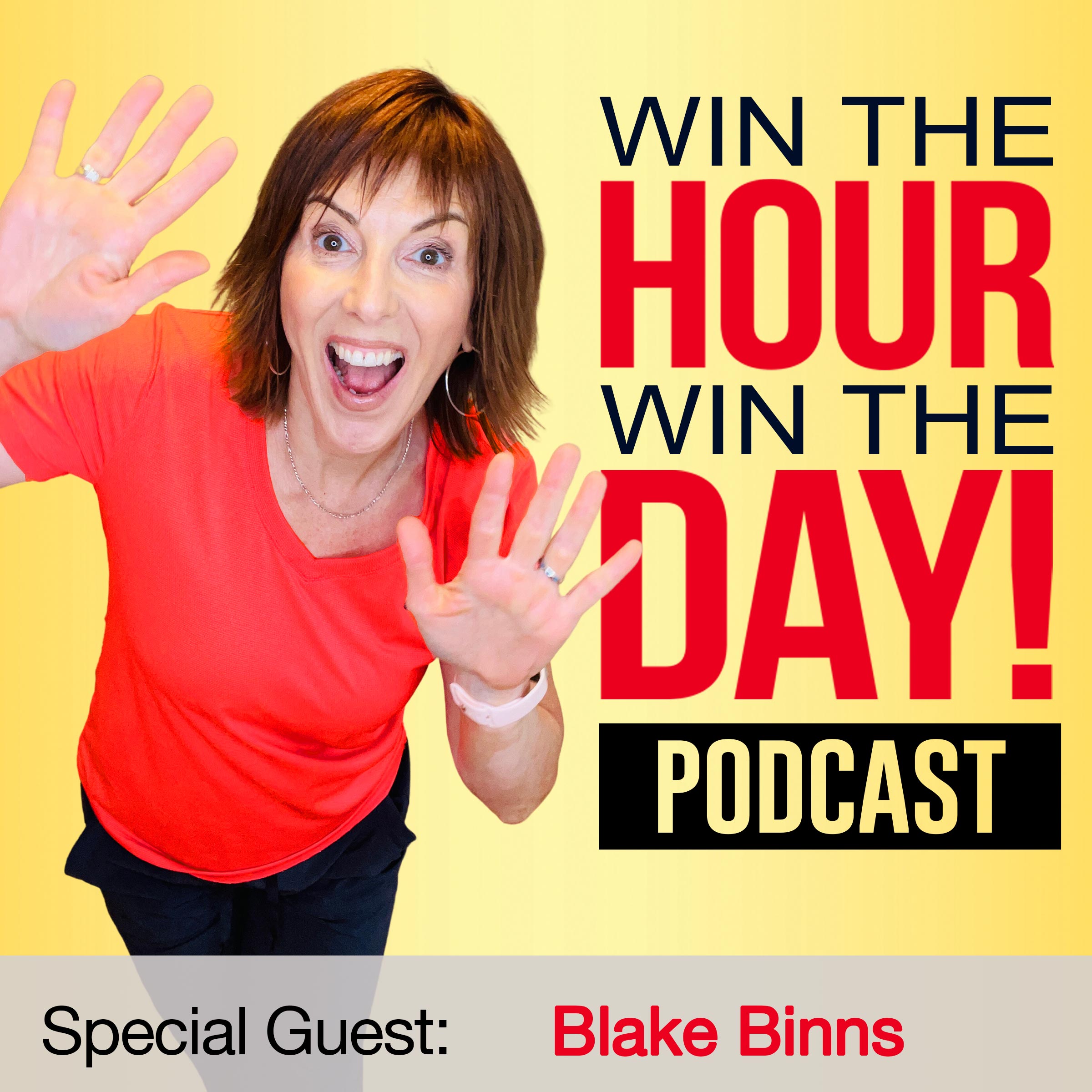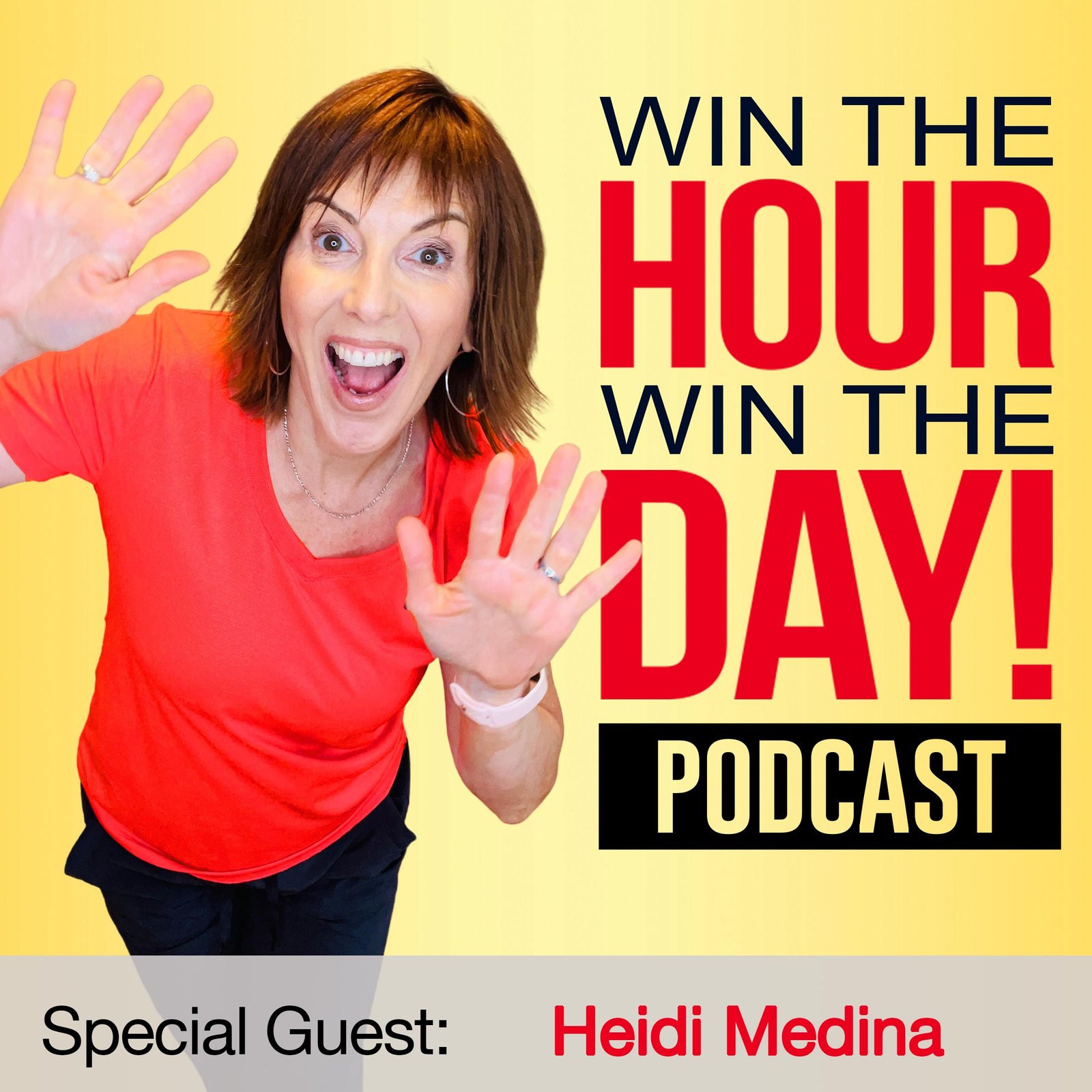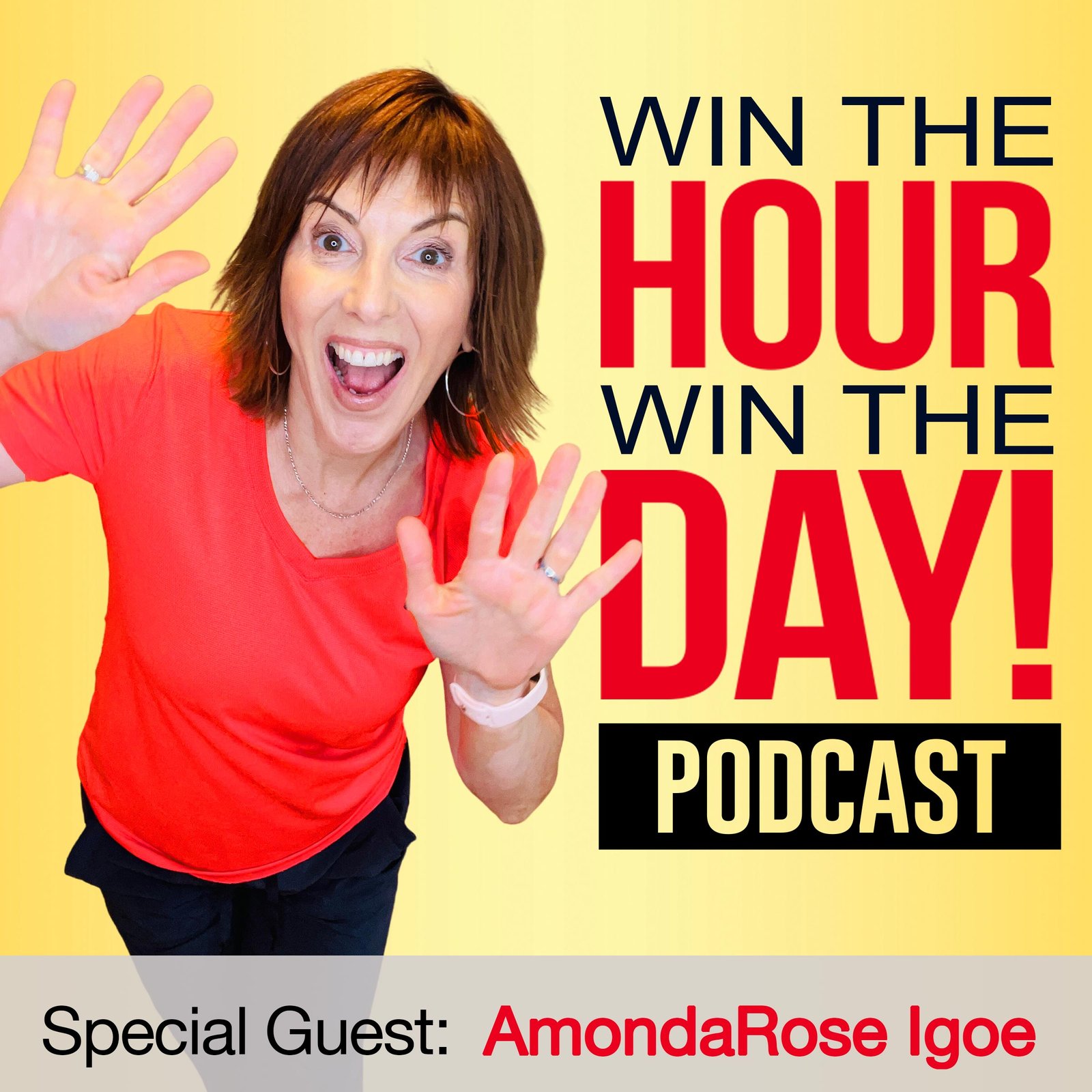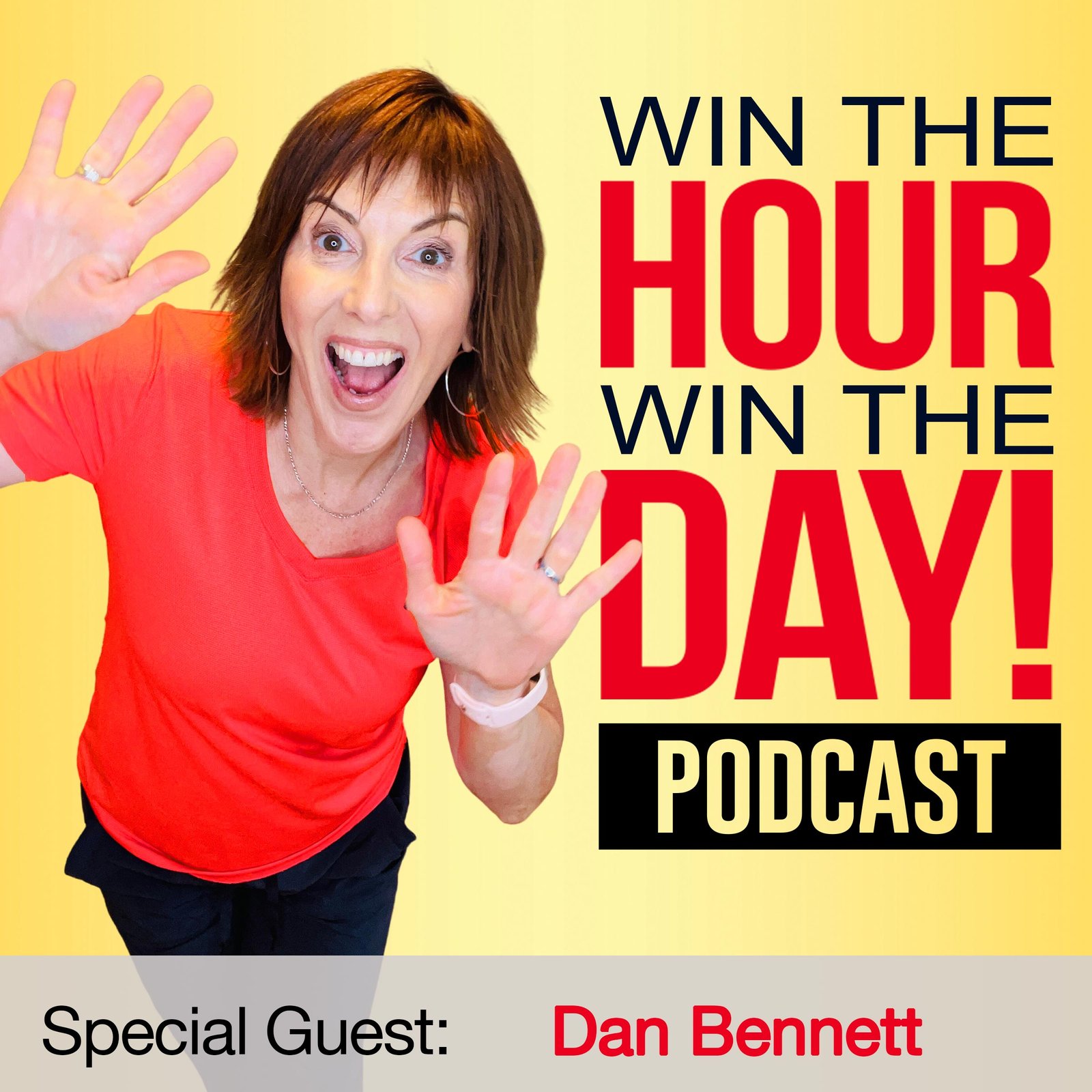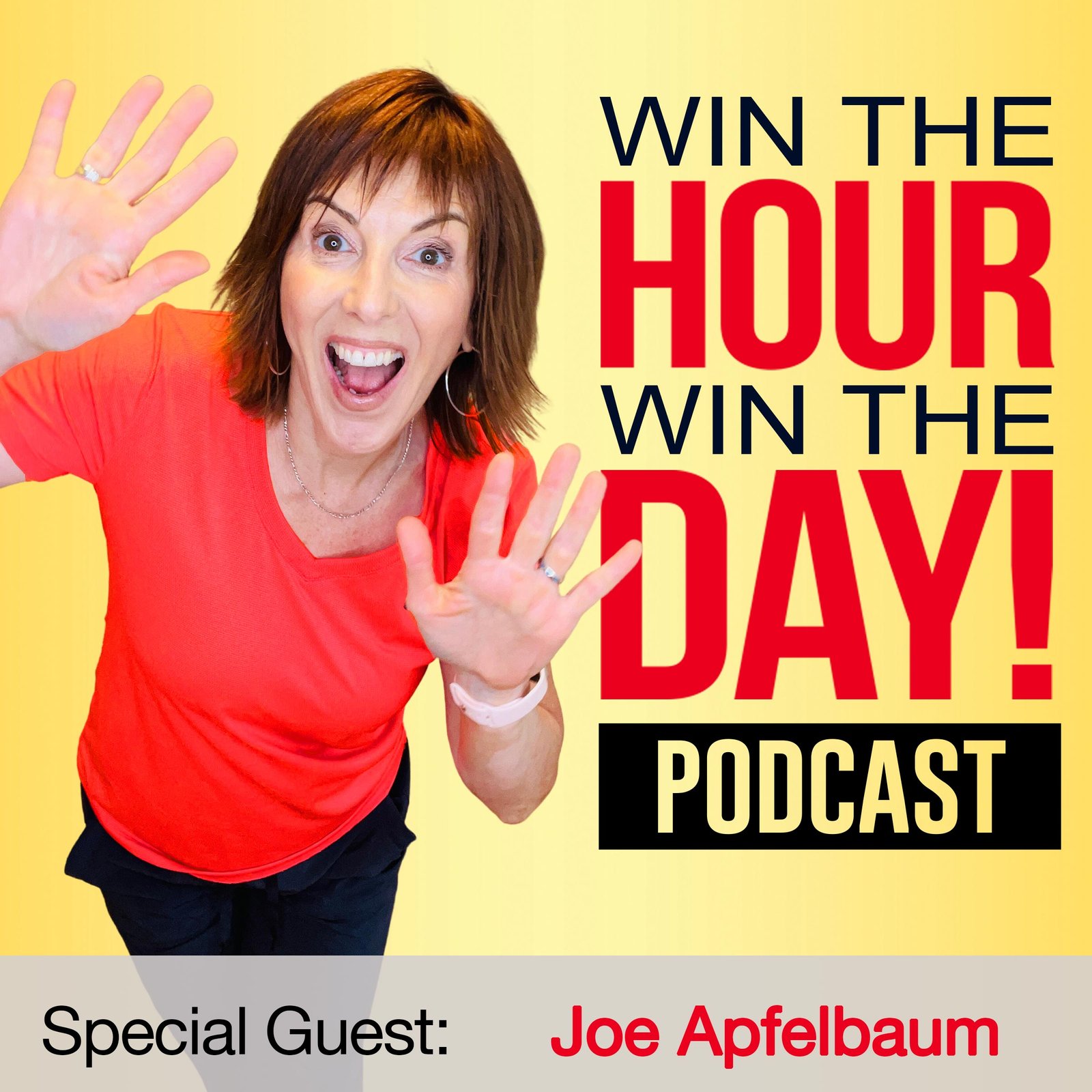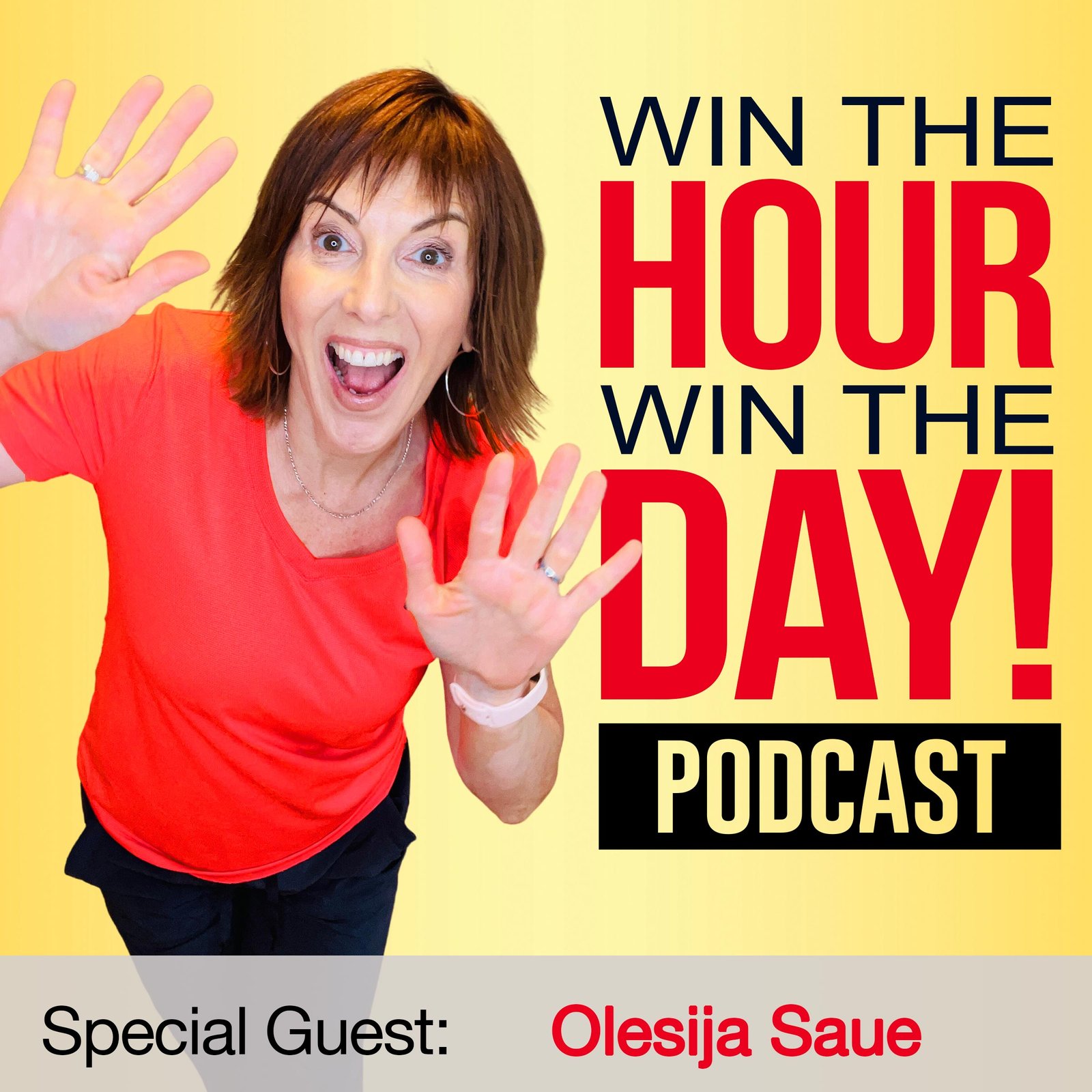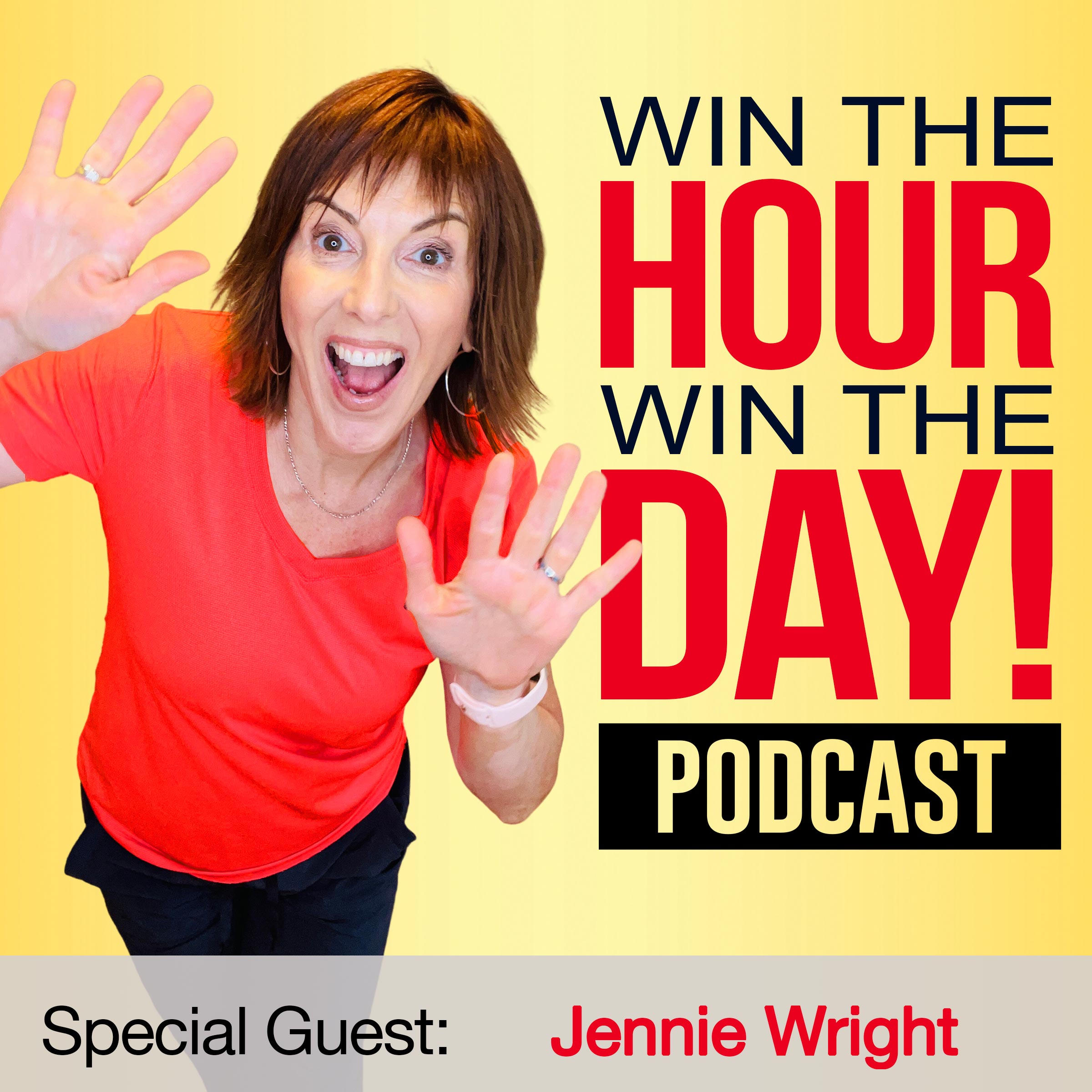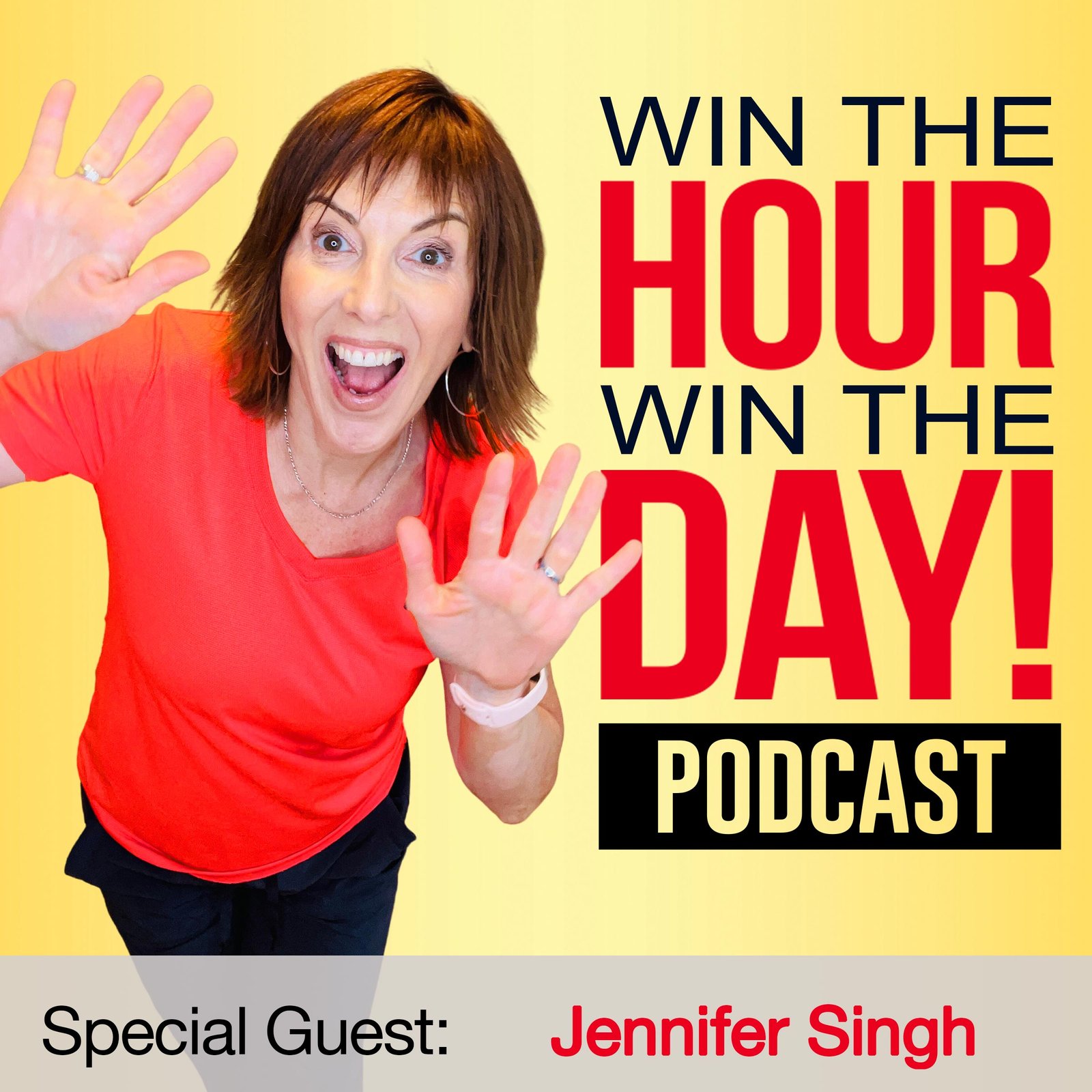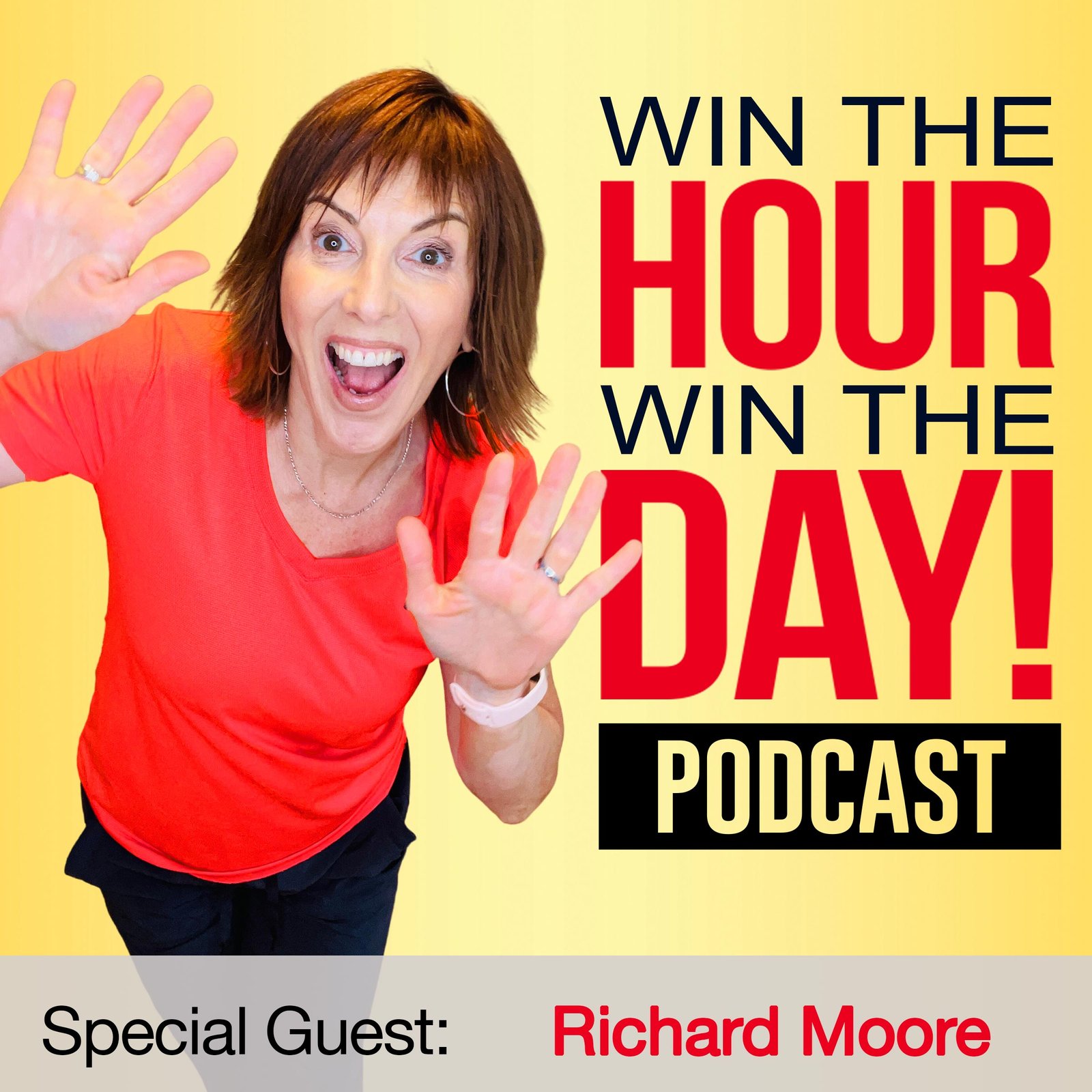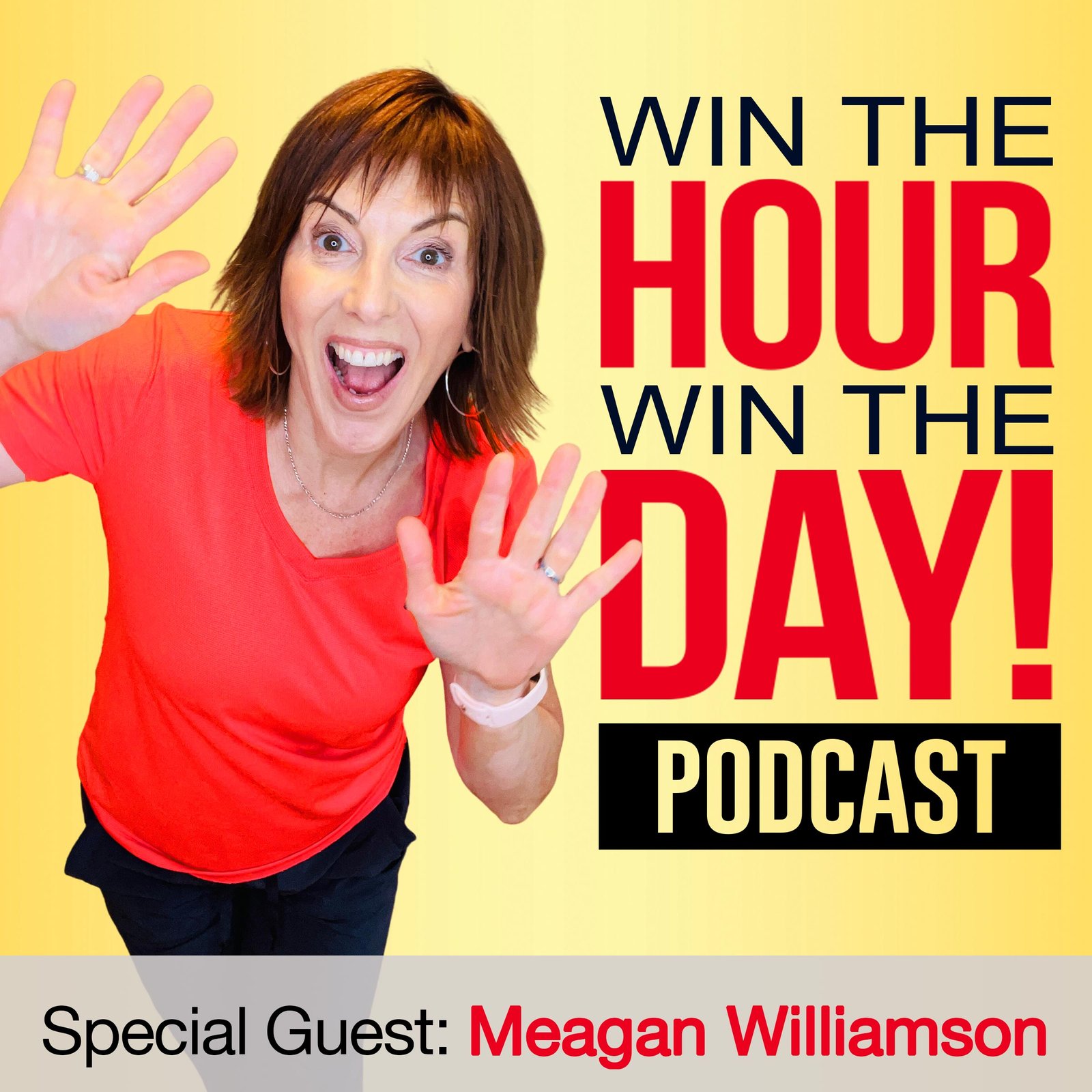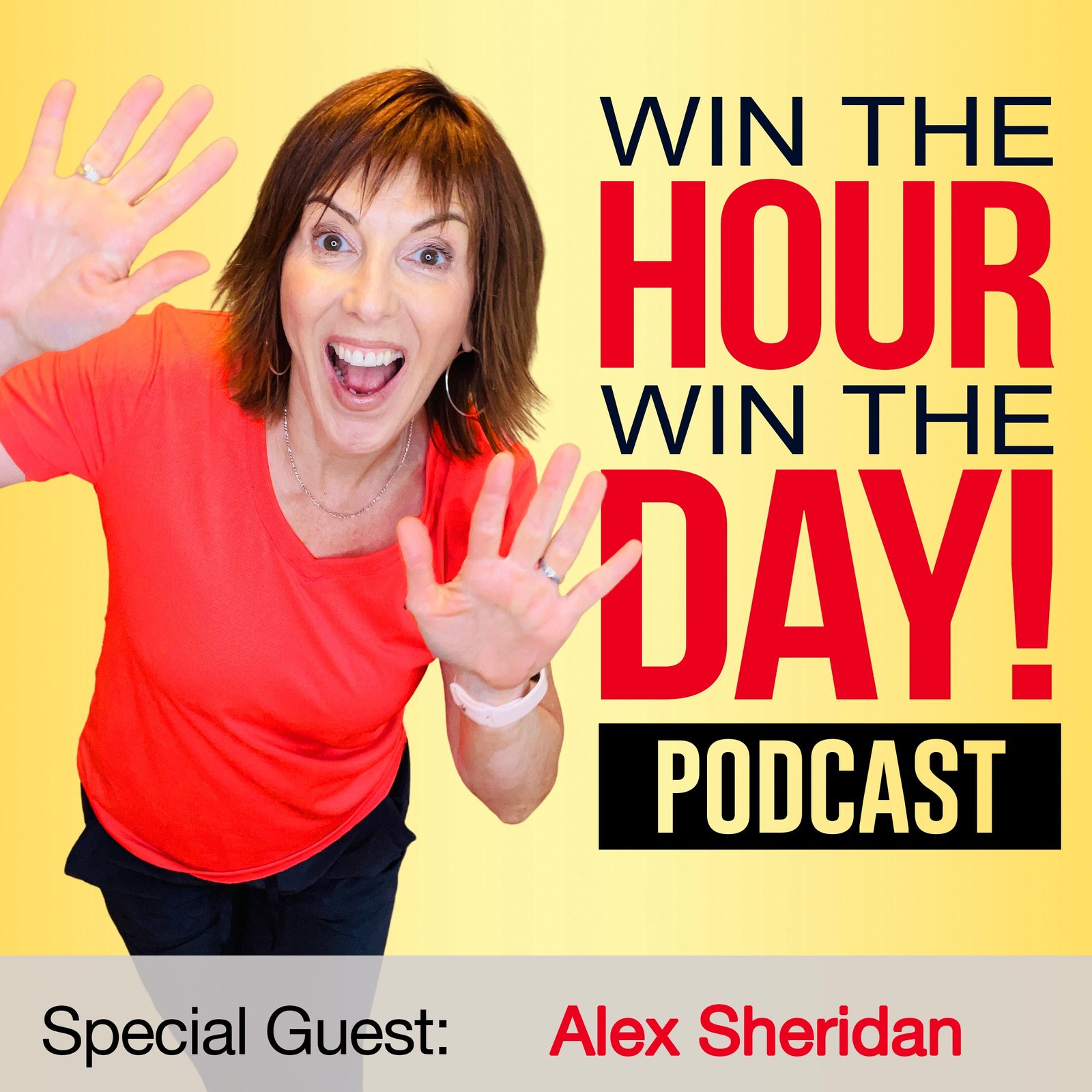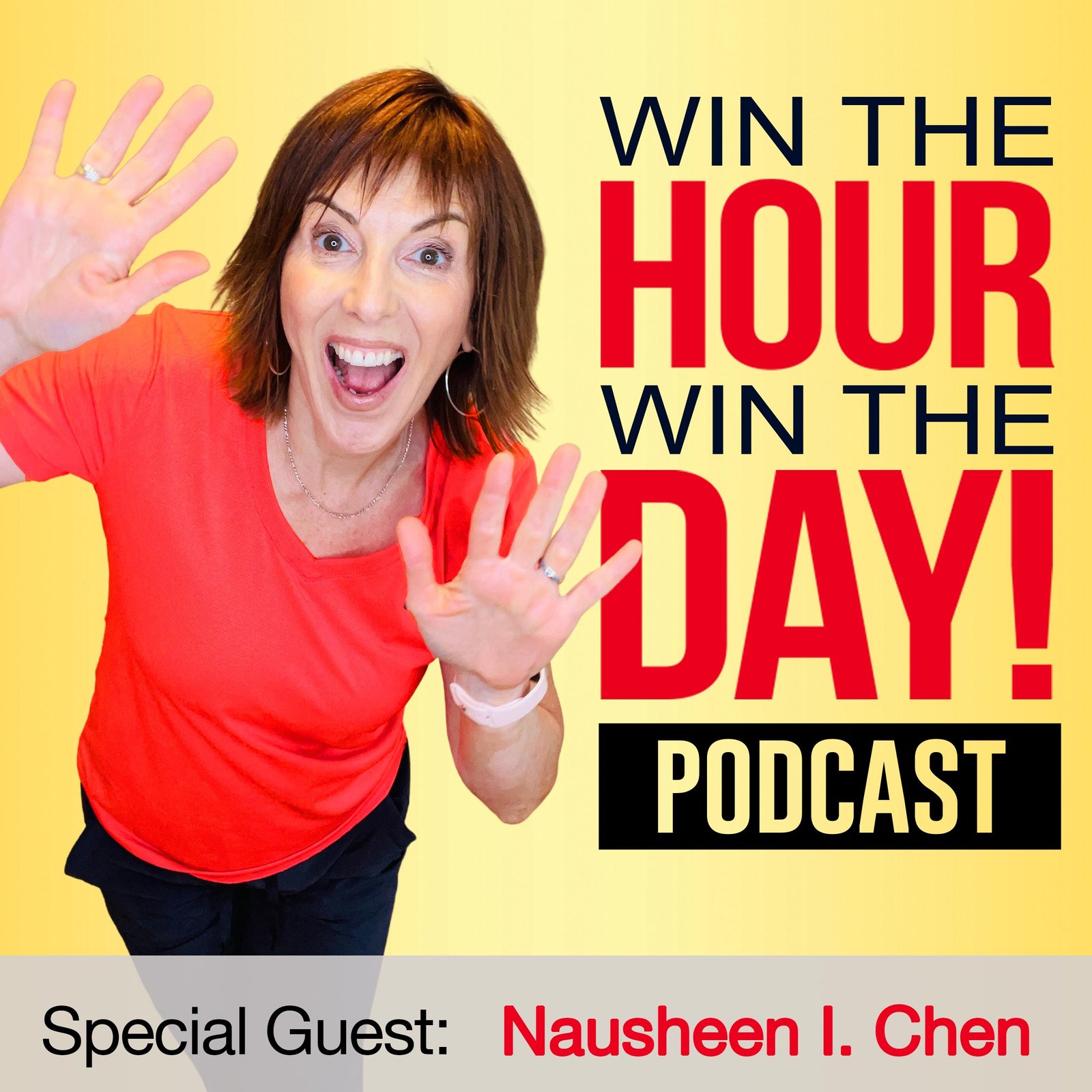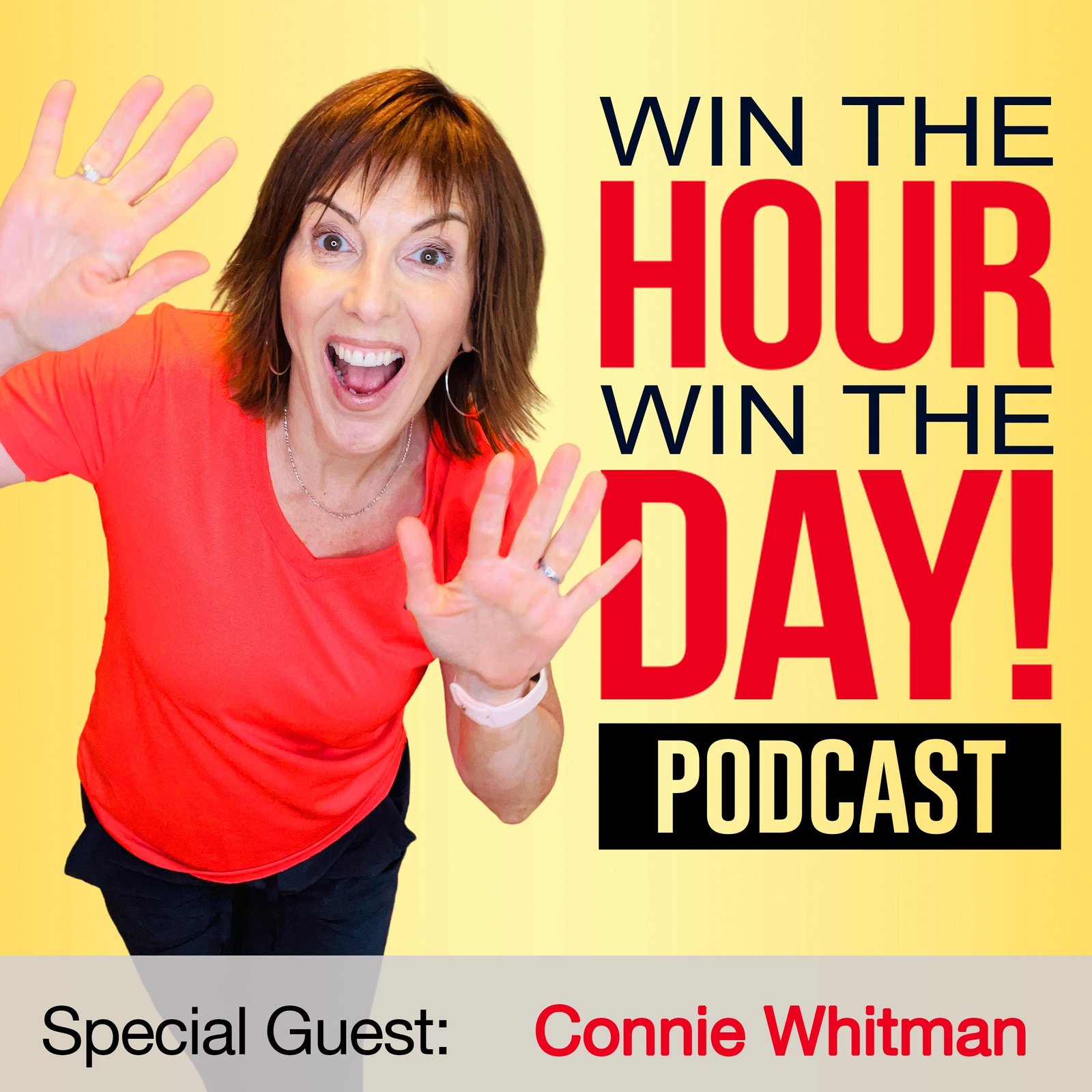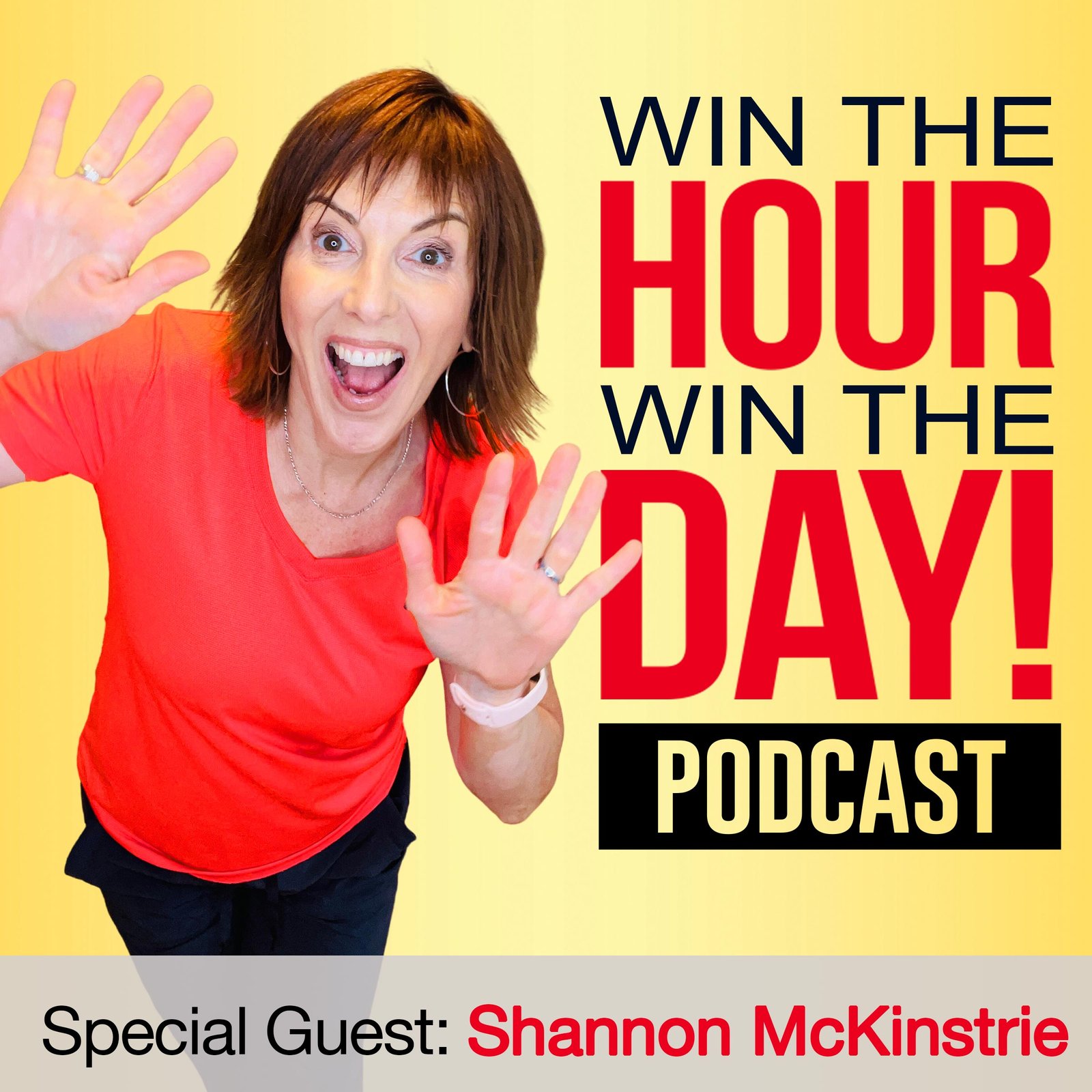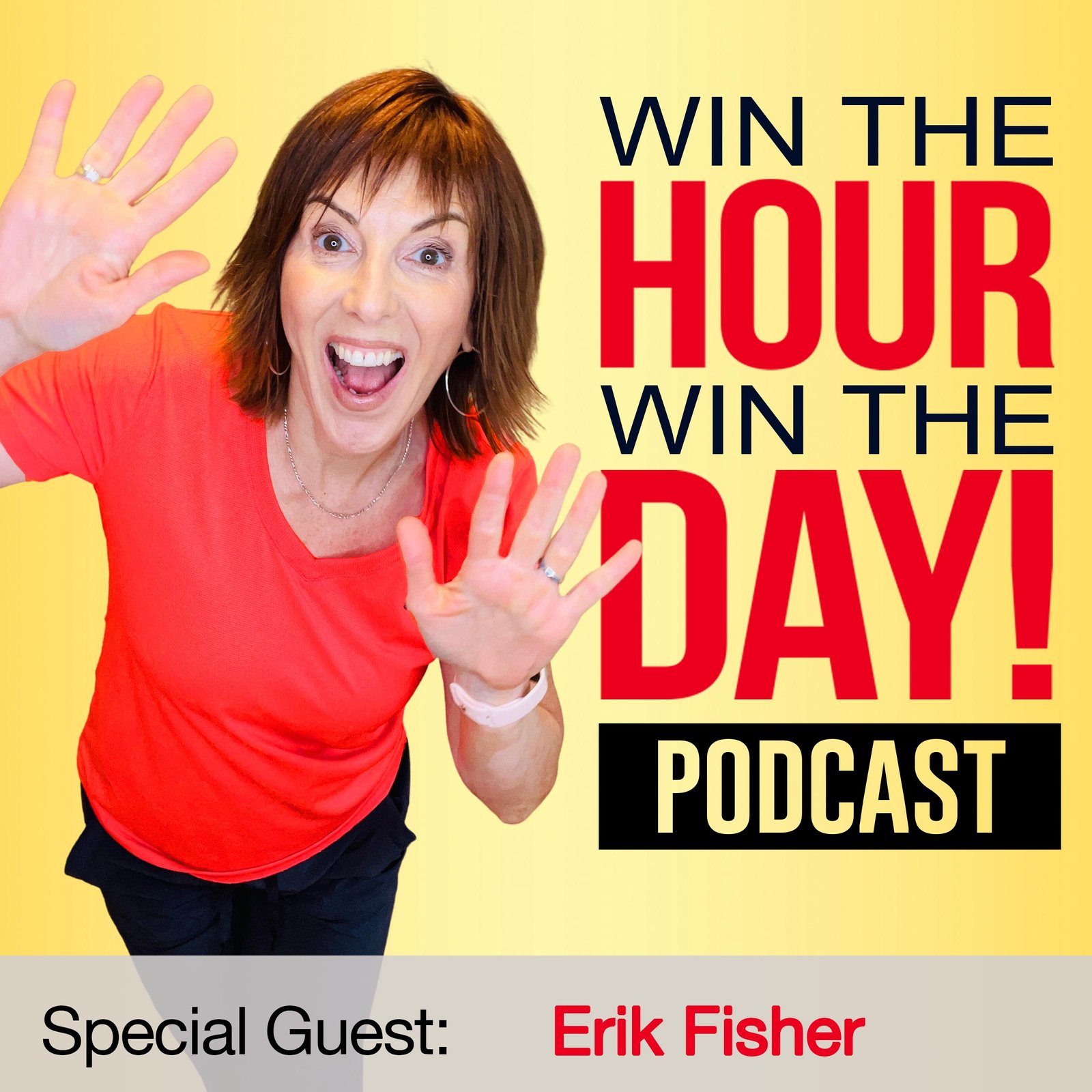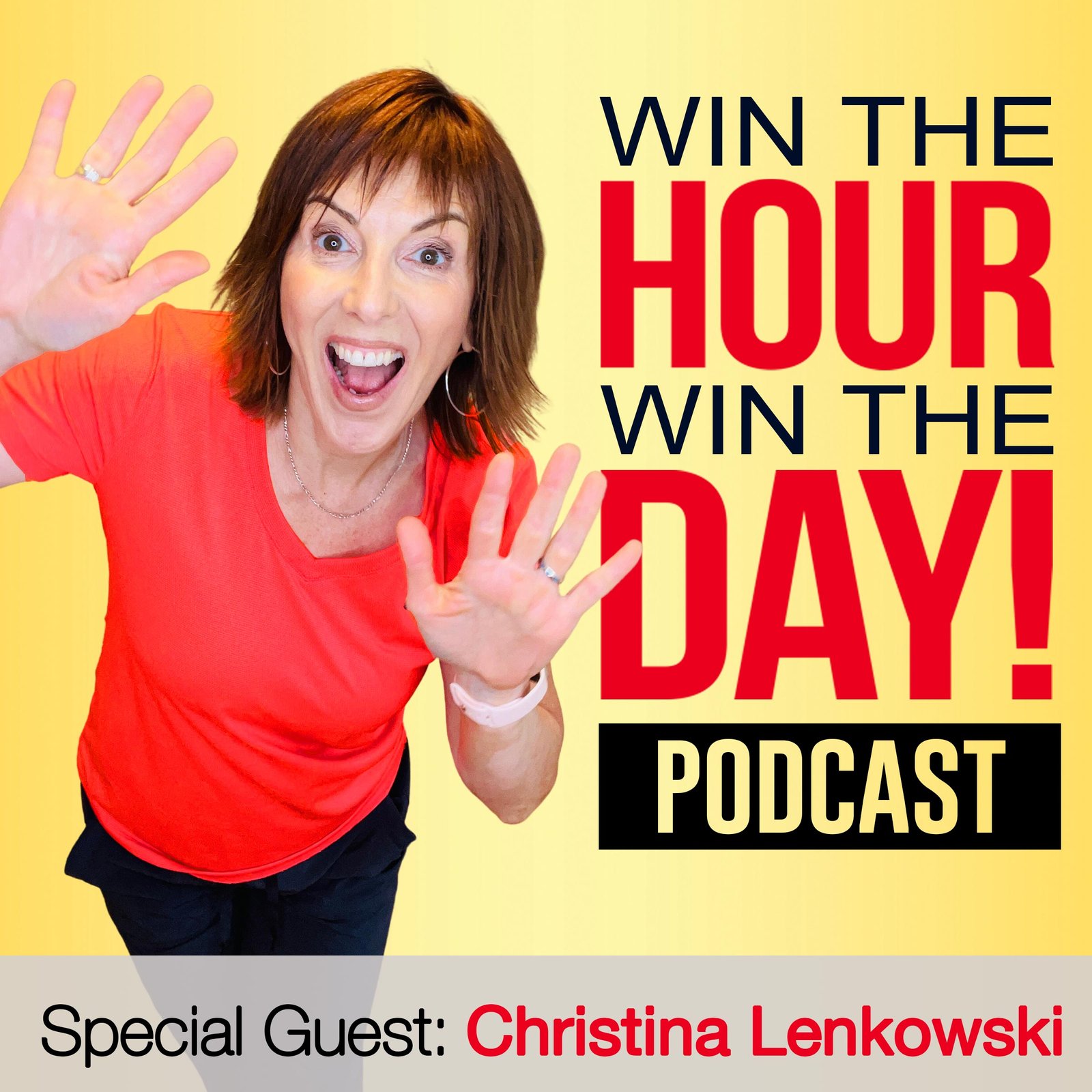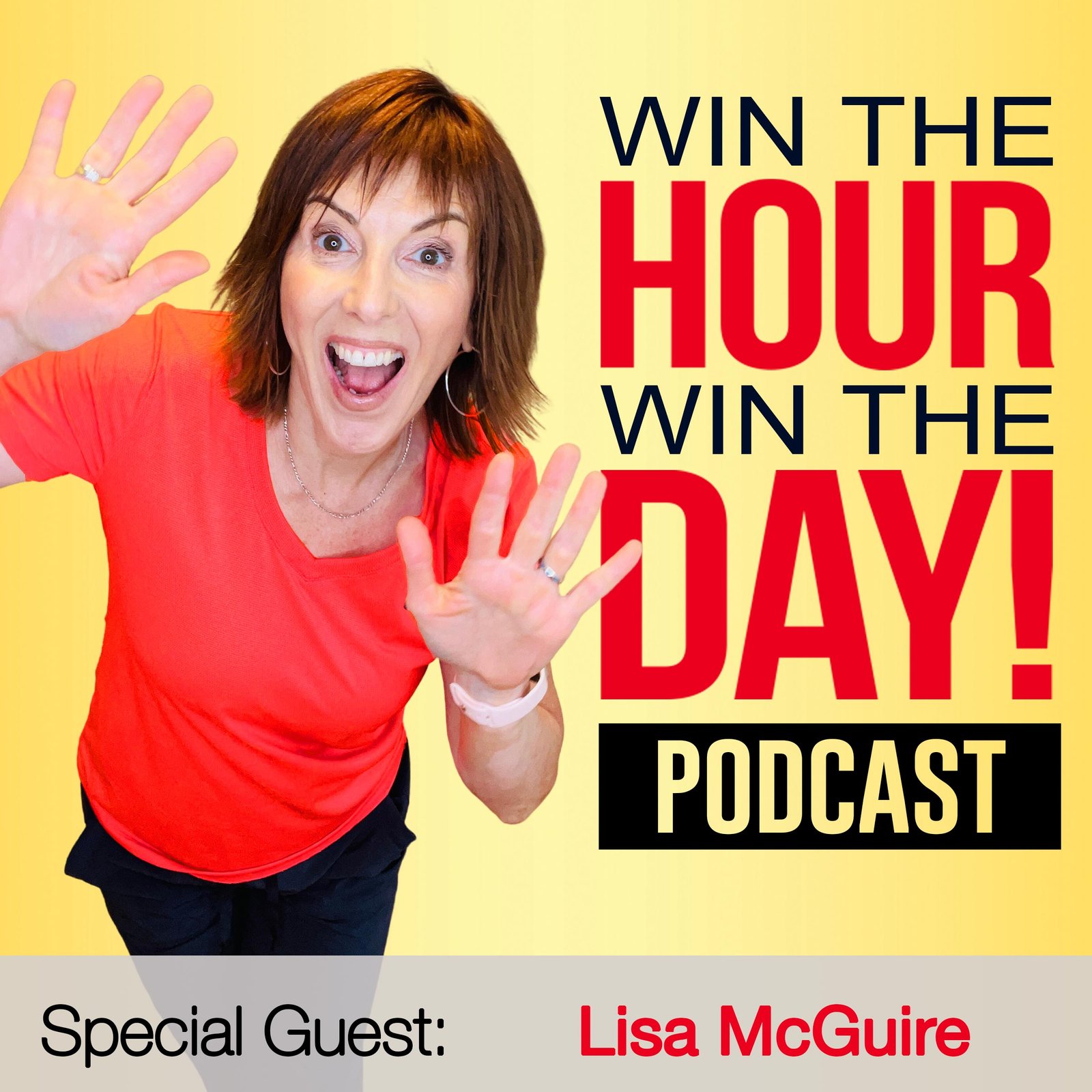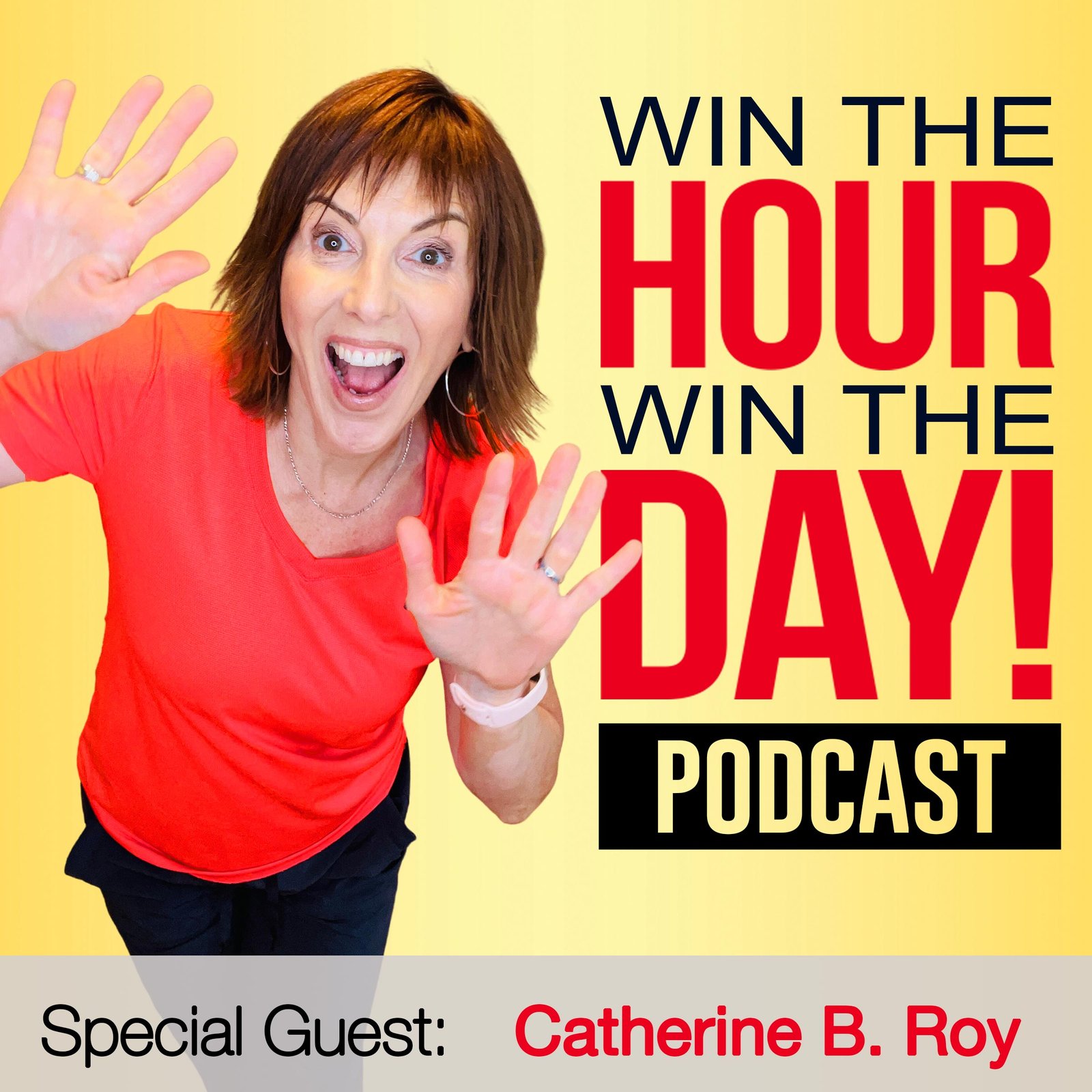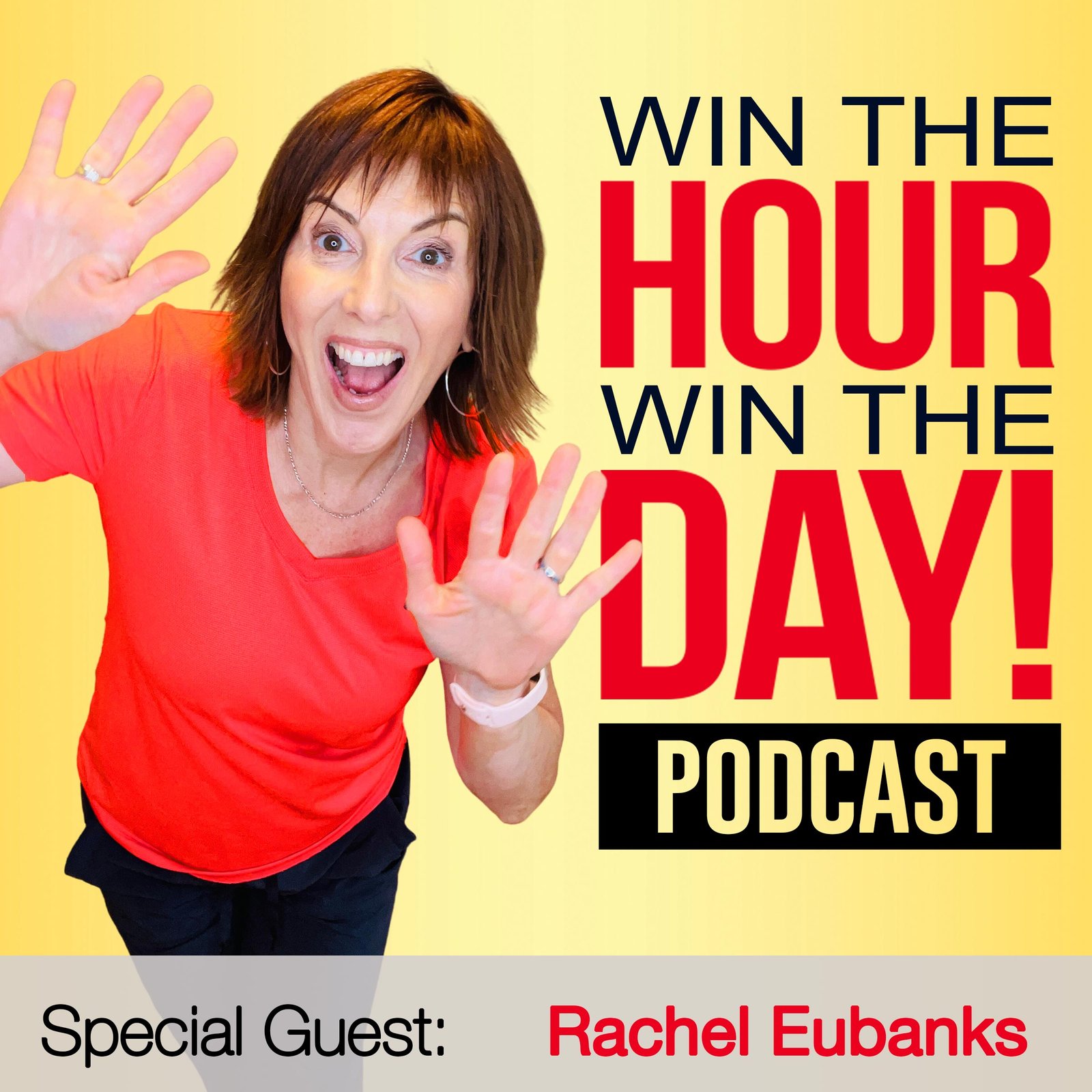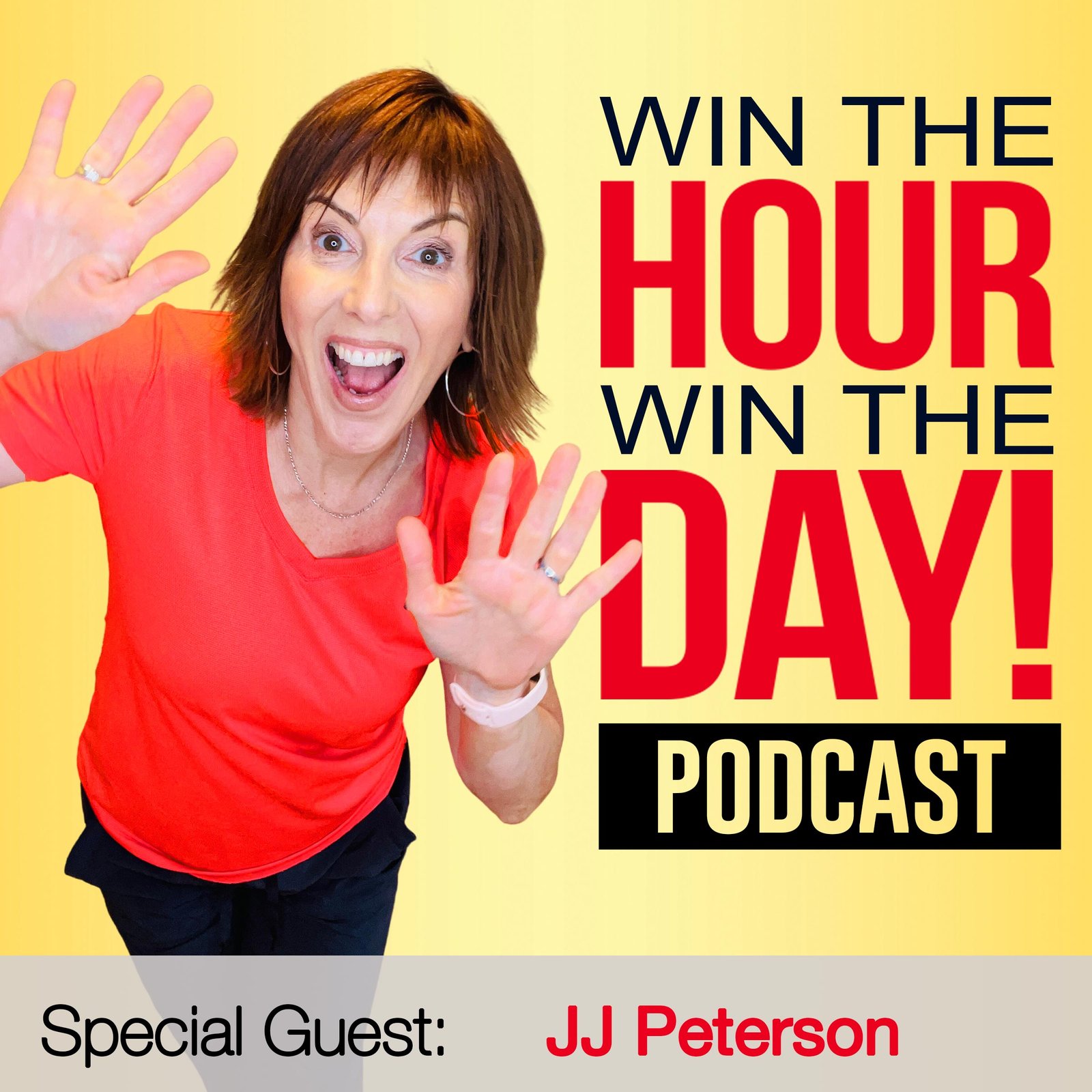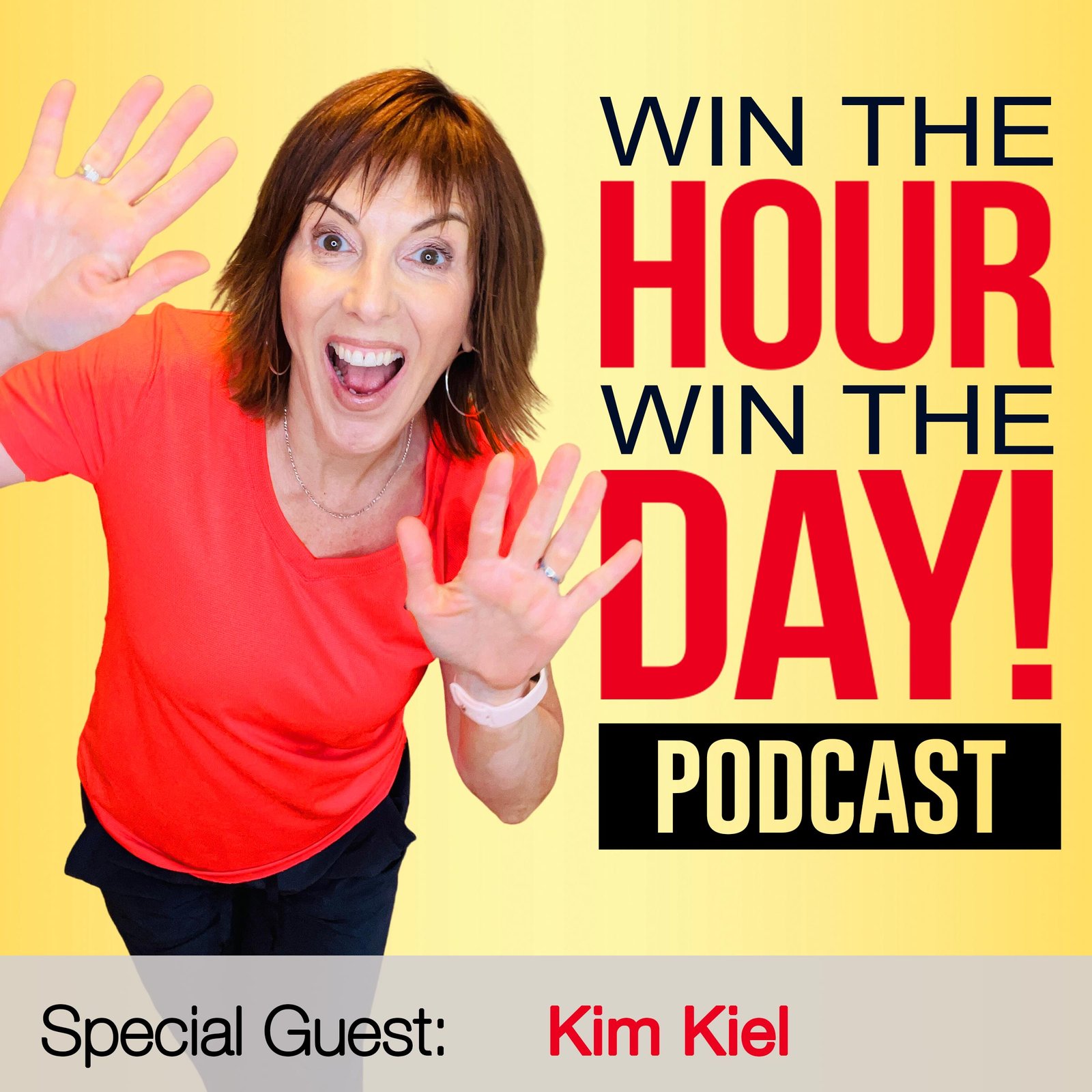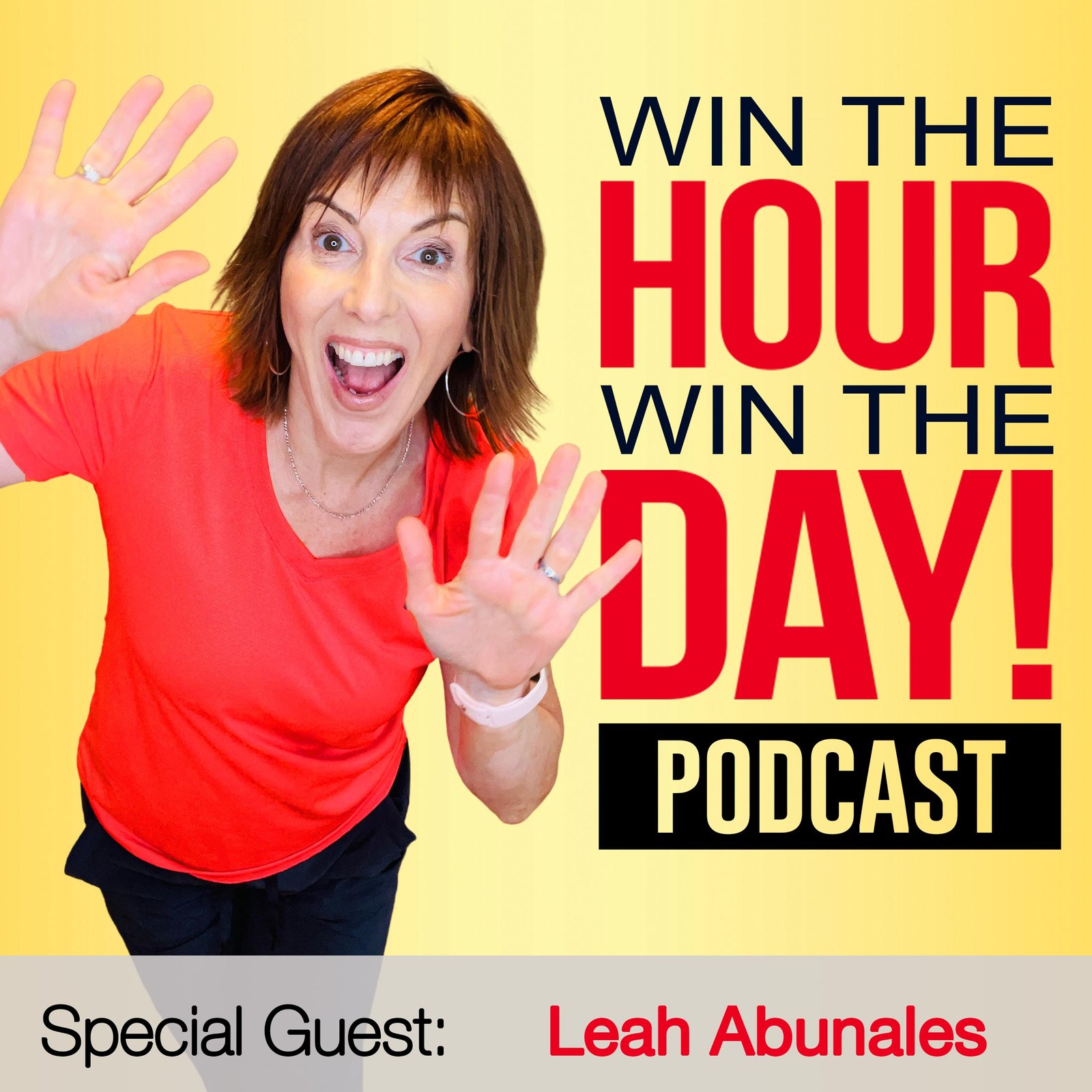Episode Summary This week’s episode of Win The Hour, Win The Day Podcast is...
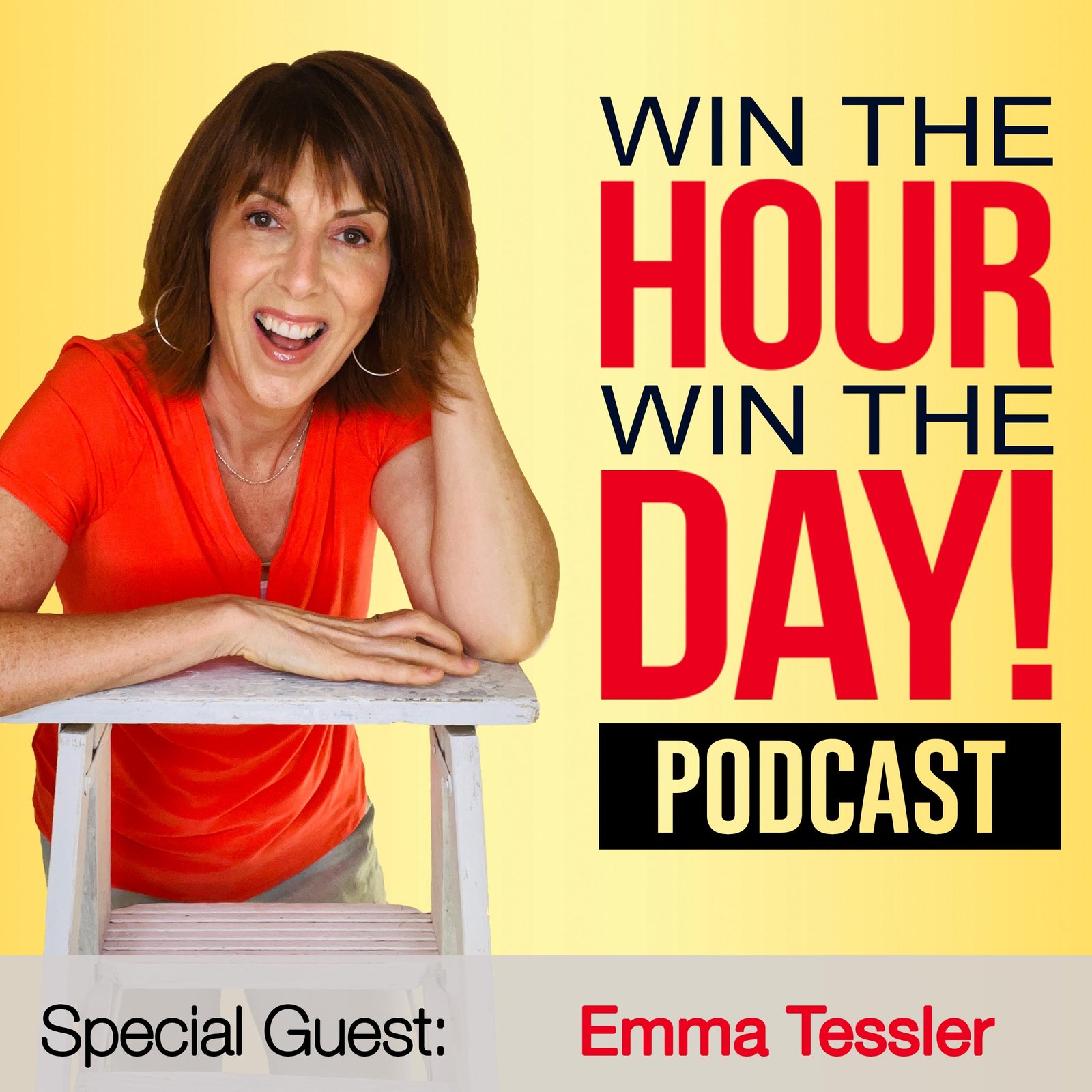
Are You Ready For Your Next Big Win?
Know your entrepreneur personality and I’ll take it from there!
Recent Podcast Episodes
Preventing Burnout with Smart Work Tools! with Kris Ward
Episode Summary This week’s episode of Win The Hour, Win The Day Podcast is...
Master Social Selling: Heidi Medina’s Strategies for Engagement
Episode Summary This week’s episode of Win The Hour, Win The Day Podcast is...
Boost Productivity and Master Storytelling! with AmondaRose Igoe
Episode Summary This week’s episode of Win The Hour, Win The Day Podcast is...
Master Video Marketing: Top Tips for Entrepreneurs with Dan Bennett
Episode Summary This week’s episode of Win The Hour, Win The Day Podcast is...
Boost Your LinkedIn Strategy with AI Tools for Enhanced Productivity! with Joe Apfelbaum
Episode Summary This week’s episode of Win The Hour, Win The Day Podcast is...
Mastering Personal Branding with NLP Techniques! with Olesija Saue
Episode Summary This week’s episode of Win The Hour, Win The Day Podcast is...
Innovative Lead Generation and Email Automation Secrets with Jennie Wright
Episode Summary This week’s episode of Win The Hour, Win The Day Podcast is...
PR Strategies for Diverse Entrepreneurial Impact! with Jennifer Singh
Episode Summary This week’s episode of Win The Hour, Win The Day Podcast is...
Convert More Clients on LinkedIn with Richard Moore
Episode Summary This week’s episode of Win The Hour, Win The Day Podcast is...
Master Business Growth on Pinterest with Meagan Williamson
Episode Summary This week’s episode of Win The Hour, Win The Day Podcast is...
24/7 Sales Boost: Video Marketing Secrets with Alex Sheridan
Episode Summary This week’s episode of Win The Hour, Win The Day Podcast is...
Master Public Speaking Tips with Nausheen Chen!
Episode Summary This week’s episode of Win The Hour, Win The Day Podcast is...
Beating The Burnout With Connie Whitman’s Success Story
Episode Summary This week’s episode of Win The Hour, Win The Day Podcast interviews,...
Craft Your Social Media Content Strategy With Shannon McKinstrie
Episode Summary This week’s episode of Win The Hour, Win The Day Podcast is...
Boost Your Productivity with AI Tools: A Deep Dive with Erik Fisher
Episode Summary This week’s episode of Win The Hour, Win The Day Podcast is...
Boost Visibility: Repurpose Content and Leverage Podcasts With Christina Lenkowski
Episode Summary This week’s episode of Win The Hour, Win The Day Podcast is...
Master Personal Branding & Storytelling with Lisa McGuire
Episode Summary This week’s episode of Win The Hour, Win The Day Podcast is...
Boost Business on LinkedIn with Catherine B. Roy’s Strategies
Episode Summary This week’s episode of Win The Hour, Win The Day Podcast is...
Scale Your Business: Optimizing Virtual Assistant Services with Kris Ward & Rachel Eubanks
Episode Summary This week’s episode of Win The Hour, Win The Day Podcast is...
Affordable PR Mastery: Crystal Richard Unveils Modern Techniques
Episode Summary This week’s episode of Win The Hour, Win The Day Podcast is...
Mastering Business Storytelling with JJ Peterson’s Guide
Episode Summary This week’s episode of Win The Hour, Win The Day Podcast is...
Revamp Your About Page: Guide to Personal Branding
Episode Summary This week’s episode of Win The Hour, Win The Day Podcast is...
LinkedIn Mastery and Video Marketing Secrets with Alex Sheridan
Episode Summary This week’s episode of Win The Hour, Win The Day Podcast interviews,...
The Systems and Processes Playbook: Insider Secrets to Streamlining Your Small Business with Leah Abunales
Episode Summary This week’s episode of Win The Hour, Win The Day Podcast interviews,...
Mastering Authentic Social Media Storytelling for Connection and Engagement! with Emma Tessler
Episode Summary
This week’s episode of Win The Hour, Win The Day Podcast is sponsored by Win The Hour, Win The Day’s Signature Coaching Program the Winners Circle. Kris Ward who helps entrepreneurs to stop working so hard interviews, Emma Tessler.
Are you tired of feeling lost in the world of social media?
Join us as our guest, Emma Tessler, guides us through the art of storytelling and building genuine connections online. In this podcast, you’ll learn:
-How to harness your unique experiences and connect with others.
-The real meaning of vulnerability and how to avoid “crying for the likes.”
-The secret to consistent engagement by committing to 30 days of storytelling.
-Tips to redefine what stories mean and how you can use them creatively.
Get ready to rethink your approach to social media, find your voice, and engage with your audience like never before.
Don’t miss out on this opportunity to elevate your online presence.
WIN Back Time Quiz
http://winbacktimequiz.com/
Win The Hour, Win The Day! www.winthehourwintheday.com
Podcast: Win The Hour, Win The Day Podcast
Facebook: https://www.facebook.com/winthehourwintheday/
LinkedIn: https://www.linkedin.com/company/win-the-hour-win-the-day-podcast
Win The Hour, Win The Day Winners Circle: https://winthehourwintheday.com/winners-circle-masterclass
You can find Emma Tessler at:
Free Course: masteryourmarketingcourse.co
Website: https://ninetyfivemedia.co/
Instagram: https://www.instagram.com/95media.co/
Podcast: https://podcasts.apple.com/us/podcast/stop-scrolling-start-scaling-podcast/id1635151196https://www.facebook.com/groups/mindbodybusinessbreakthroughs
Win The Hour Win The Day
https://winthehourwintheday.com
Emma Tessler Podcast Transcription
[00:00:00] Kris Ward: Hey everyone. Welcome to another episode of Win The Hour, Win The Day, I am your host, Kris Ward. And today in the house, we have Emma Tessler and Emma is the CEO and founder of 95 Media. And she’s going to talk to us about content pillars for connection when you’re telling stories.
[00:00:17] And I’m excited to dive into this because I’ve got a push-pull relationship with storytelling, Emma. So I know I could use your help and I know storytelling and making a part of your social media. They tell us all the time how it’s relatable. But I get stuck in between two worlds. So welcome to the show, Emma.
[00:00:37] Emma Tessler: Thank you so much for having me. I’m so excited to be here.
[00:00:40] Kris Ward: Okay. All right. So my pushback for the longest time was it just seemed like storytelling was here is the dark and the wretchedest parts of my childhood. Let me share with you or let me send out something on Facebook that says I need your prayers and I don’t mean, I don’t mean to mock or whatever, if that’s your lane, that’s fine.
[00:01:04] It just was never mine. And I never saw how it just is not how I navigated my life, but, and I try to be positive nature, but I also just saw it as not a place for business. So I sometimes perhaps went too far the other way. And then I’m not. I hate to say, and I’m not relatable cuz I should be relatable cuz I’m just, I am not doing anything exceptional or exciting, so you should all be able to relate to me.
[00:01:31] But, so where do I start with the storytelling when we get lost right from the onset?
[00:01:37] Emma Tessler: Yeah, I think a lot of people are in your same exact boat. Storytelling can feel like this huge hurdle to get over to fully understand and implement when really what we’re all looking for is just connection on social.
[00:01:50] And we forget that a lot of the time because we forget that Social is supposed to be social, and it’s supposed to allow us to connect with other people. And personally, I think that the easiest way to start storytelling is to get on Instagram stories, which is ironically named just to do that. And stories on Instagram are like Instagram stories are really meant to give that behind the scenes look, it’s temporary content, right?
[00:02:16] It’s only there for 24 hours. And so when we can take that lens off of, I’m bearing my heart, I’m telling all of this deep, dark things that are happening in my life and realize it’s really just going to be there for 24 hours. I’ve personally seen, and many of the brands that we’ve managed have seen the same where people find those connection points with you with that content and allows you to give different angles to your life outside of just the business world that they typically see on a day to day basis.
[00:02:46] Kris Ward: That’s a good reminder because I was all up in it for a little while and okay, I can do this. I can do that. And then you just, it doesn’t take long for it to be something that you used to do. So I really was doing that for a while and I don’t know why, but I stopped. So great reminder, Instagram stories.
[00:03:05] Okay. Cause you’re right. I still look at other people. I’m not on Instagram a huge amount, but when I am, I’m popping the stories cause they’re a quick hit. Okay. Great.
[00:03:11] Emma Tessler: Exactly.
[00:03:12] Kris Ward: Okay. All right. Writing that down. Kris Instagram stories. Okay. So then my other issue is sometimes if I want to say, do short form video and I want to tell the story, I find that then you have to tell this to edit the story.
[00:03:29] You have to tell the story. Behind the story for in order for people to understand the story, right? And then your story gets too long. I cut, my mom came from a very large family, so you had to talk quick and talk loud and to get your voice heard. So I don’t ramble on, but in the world of swipe, when you’ve got two seconds, it might be a 40 second story that I should have had down to 16 seconds.
[00:03:53] So how do, where do you start when you’re crafting sort of an efficient story? What are the key elements that you’re looking for?
[00:04:01] Emma Tessler: It’s interesting you say that because actually what we’re seeing more so trending on platforms, especially Tik Tok, where video storytelling is the crux of everything.
[00:04:11] If you actually start a story halfway through and you don’t give as much background knowledge as you might feel is needed, it’s very enticing to the person watching. And they might say, wait, I have to go back. I have to understand what else is happening here. They go to your profile and then they binge all of your other stories to get some of that background.
[00:04:29] And some of the most viral storytelling on Tik Tok has been. I was walking down the street one day with my five kids and one of them fell and then we had all this experience and you’re like, wait a second, why did you have five kids with you? What’s going on? Where were you coming from? What were you doing?
[00:04:44] And because you gave none of that background, it there, it’s forcing the consumer to actually go to your profile and consume more. So with that being said, we want to have videos that give that context to your life and that explain who you are and give background knowledge and opportunity for connection points, because that’s how someone’s going to relate to you.
[00:05:04] But I don’t believe that every single video or every single story has to give the entire picture, because when you don’t, it actually gives opportunity for more consumption of those other pieces of content you’ve created.
[00:05:17] Kris Ward: So sometimes I think of stories when my business was new, where my mind was like, I was so sleep deprived and thought that was a coping strategy, go fast, go hard, whatever.
[00:05:27] So it was always a running the clock and see now I’m telling you a story before the story. And so I… like you, you’re really, your brain does really start to shut down. So I remember walking down this hall one time and I had to go back and forth between these two meetings. And here was my insanity moment, which seemed very rational at the time.
[00:05:43] When I was walking down one way, it was big, huge long hall. I thought I will close my left eye and rest it and it will sleep while I walk. And on the way back I’ll do the other eye and that should set me straight for the rest of the day. This is, I was clearly not well, so even just telling you now that whatever that was, 30 seconds.
[00:06:01] But then there’s a preamble to that. So maybe if it’s on TikTok, where it’s TikTok, I sound like I’m a hundred tac. Maybe when it’s on TikTok. I could even cut it down further saying I’m walking down the hall and I close one eye to nap to get to the next office. And then coming back, I closed the other eye and this was my insanity of thinking this was rest for me when I was a new business.
[00:06:27] So that could have been the story instead of me explaining my business was new and it was a building and I walked these two meetings, blah, blah, blah. So I could have done it that way. Is that kind of what you’re talking about?
[00:06:38] Emma Tessler: Yeah. Or if… Say you wanted to make the video that tells the story of the, that phase of your business where you were sleep deprived and you were exhausted constantly.
[00:06:47] I would start these, the video by saying I was walking down the hallway. I closed one eye one way and the one eye the other way. And I was so tired. I thought that would give me the rest I needed for the day. Can you imagine being in that position while I was, and for these, this many years, this is how, this is what I was going through.
[00:07:03] This is amount of sleep I was getting. And now over time, I’ve built my business like this, but that is the hook. That’s what gets people to stay watching rather than saying, that preamble and then that really interesting, funny part of the story.
[00:07:15] Kris Ward: Okay. This is profound. So we’re thinking sit in the chair Mrs.
[00:07:20] So and it’s kindergarten. Everybody get in the circle. We’re going to tell a story. And what you’re saying is you can summarize, skim, shorten the story profoundly, and that could be the hook. Your story could be the hook. Your story doesn’t have to be the event.
[00:07:35] Emma Tessler: Yeah, or just find like the really crazy out there, funny part of the story and start with that rather than building to it.
[00:07:41] Because I think a lot of the times we think about stories and like building the crescendo of the story. But now today you have to tell that crazy part first in order for, to make people want to watch the rest.
[00:07:53] Kris Ward: Okay. Oh my gosh. That is enlightening. Somebody, I should have talked to you five years ago because I just avoided stories or then I knew they were too long.
[00:08:02] You know what I mean? And by too long, again I’m talking like 30 seconds. I’m not talking three minutes. But I’m like, okay, by the time they get to the pinnacle, I’m 25 seconds in they’re gone. All..
[00:08:12] Emma Tessler: And I think that, your story, everyone’s story is interesting. And someone always wants to listen to the full story.
[00:08:17] It’s just, we have to make them know what’s coming. We have to build the hype first because our attention spans have gotten so short. And so I think if you had come to me five years ago, I wouldn’t be saying this because our attention spans weren’t like this and Tik Tok wasn’t here. And the way we consume content has just changed so much over the past three years that now it’s just become to the point where we have to grab people in the first three seconds, otherwise they’re not going to watch the rest.
[00:08:41] Kris Ward: Yeah. And I know that, I’ve been told that we’ve all had that shoved down our throats. I know the first three seconds are important. So then what I would be doing was giving a hook or a title, saying, “Oh my gosh, whatever. Here’s my most insane moment when my business was new thinking,” okay, there’s the hook and now please, can you give me 20 seconds till I get to the crescendo of the story?
[00:09:01] But it reminds me like Aaron Sorkin or, or a really good movie done well. When the movie opens up, you have to catch up with what’s happening. There’s okay, I don’t even know who all these characters are, but they’re running in a room yelling at each other.
[00:09:13] And it’s my job to catch up with what’s going on. So I think I was taking so many people give us a framework, back to school, beginning, middle and end. And I’m trying to condense that three minute story into whatever 30 seconds, but still by going with the beginning, middle and end, I’m losing you by the time I get to the middle.
[00:09:31] Emma Tessler: Exactly. And now a lot of the times people are doing parts of stories, right? So you say the first two minutes of the story and they say, go to part two for the rest. And then you watch the second part and then you’re forced to consume because really our goal as content creators, as business owners, creating content is to keep people on your page, watching your content longer, because then that’s going to make that content, your future content show up on that consumer’s feed moving forward too.
[00:09:55] So however long we can keep them, they’re watching bingeing, going through more posts. That is the ultimate goal.
[00:10:01] Kris Ward: Yeah, we know what the goal is, Emma. We just weren’t getting it. I know what the goal is, right? I got the goal clear how I’m getting the goal not working so far.
[00:10:11] Okay. So then I don’t even know what I don’t know because everything that I was resistant about and pushing on stories, you’re turning on its head. So why don’t you guide us on some the general stuff that you see going poorly or wrong, or where should we be tightening things up?
[00:10:27] Emma Tessler: Yeah a really common mistake that we all make and myself included, I’m guilty of this too, is when we tell stories on social, we focus more on the business side.
[00:10:38] We tell the business story. We tell our journey. We tell, what are we working on today and work and all of that kind of stuff. We forget that other people are looking at us as humans outside of just the work that we do as well. And so I, I really love the idea. And I work on this with all of the brands that we support in creating and building out characters in your stories that you can refer back to.
[00:11:05] So thinking about the way you tell stories and who you reference in stories as if you had your own mini show. So thinking about characters in your life. Is it your husband? Is it your two kids? Is it your dog that pops up and sleeps in your office while you’re on Zoom calls all day? Is it the Walk in the park that you take every afternoon to decompress.
[00:11:28] Do you love your morning coffee? These are different characters, quote, unquote, that you can introduce and people can begin to recognize. And we often see this with just partners in our stories. And so someone will say, Oh, so and so he brought me flowers today. And you love that because, you’ve seen their relationship develop and have very condensed professional way over the past months or years that they’ve been talking about this person and their stories.
[00:11:54] But by doing this, you create these connection points with the viewer so that it’s not just you and it’s not just your work that you’re talking about when you’re storytelling.
[00:12:04] Kris Ward: Okay, so my head. I have all kinds of questions. One, the characters don’t necessarily need to be people. So the characters could be an activity or something you’re doing.
[00:12:13] So they could be piece of the story. So recently I have started rock climbing and I do find it fascinating that it’s really about strategy. Like there is definitely you need strength, but also where you really get good at it is when you’re not using brute force and you’re using strategy. So there’s a lot of things that I do find parallel to business.
[00:12:33] And also just sometimes like I made a route last week, they’re called routes when you get a certain path, like they’ve got different obstacles deal. And I was so frigging excited. That’s Oh my gosh, it took me three weeks to get this. And who could I call and explain this to? So do I take people on my rock climbing journey, but even that I feel like I there’s too much explaining to do, but I guess I could do a short story on Instagram.
[00:12:54] I’m back to rock climbing again, had a great night rock climbing, like new plateau rock climbing. So I’m thinking again of telling it like the teacher beat into my head, grade three, four, and five is the the, the entirety of the story, but I could be talking about, Oh, it’s now I love bike riding and it’s getting warm here where I am. So just telling those things in my life. Is that what you’re looking at?
[00:13:17] Emma Tessler: Yeah.
[00:13:17] Kris Ward: Not tying them into business, not saying, Oh, and this reminds me of business.
[00:13:21] Emma Tessler: Cause then it seems a little pitchy at the end of the day, when it comes to introducing something new in your life.
[00:13:26] Yeah. Do the intro, but also remember that most people are not going to actually see that introduction. And then it’s also okay to just jump right in, like to set up your phone, say you’re in the rock climbing gym and you just set up your phone and you do a time lapse of you climbing the wall that afternoon and you just post that right. And say Oh, just a fun Tuesday afternoon. I feel so grateful.
[00:13:47] I can take this time off and not be behind my desk until 5 PM, whatever you might be wanting to say. It’s also okay to just post that and not give like the entire reference because someone will DM you and they will say, wait, I didn’t know that you do this. I do this too. When did you get into it? And then you’re able to form those deeper connections with people who have that connection point with you.
[00:14:07] Kris Ward: Oh my gosh. It’s oh, I was like, I don’t have time to talk to you. I got to go do stories now. There’s things I can do. I just got lost. Okay. Do you have a guideline or here’s 40 things you can you need to have this for us so we can look at it because we look at our own lives and now.
[00:14:27] I am my team constantly before I was even rock climbing. They’re always saying we need more personal stuff and they pushed me for a while and then they, I did it for a bit. As I said, Instagram stories and then I don’t know, it all petered out, whatever, but it was constantly, everything I was looking at was like, Oh, can I do a story about this?
[00:14:42] Like that kind of thing. But when it’s your own life, especially I like a quiet life. I get up early. I exercise, I do these things. And so then I think that’s boring, but now I’m starting to see you’re right. I could time lapse going up the wall that I wouldn’t have to explain that. So I think you always, and I agree with you, you look at somebody online, you think you know them because they have chickens and they do a video every morning, letting the chickens out.
[00:15:03] How cute is that? What do I care about chickens? But I know they have chickens. And yet when you’re in the bottle, you don’t see the prescription and you get lost.
[00:15:12] Emma Tessler: There’s this idea of documentation over creation that I love. So the idea that, you’re not creating new content constantly, especially when it comes to storytelling, literally just documenting your life even if say you wanted to create an Instagram reels, right?
[00:15:28] And you were stuck on the content to create, but you have this trending audio, it’s like a song or it’s a voiceover, if you were to just set up your phone again, going with the rock climbing route, just set up your phone and record yourself, like putting on the chalk on your hand and the shoes that you’re wearing and that 10 second clip can be your reel.
[00:15:48] And then you just put text on top of it and you can use those analogies that you were mentioning about how does business connect with rock climbing. Put that as the text on your reels, because reels are a way that you can storytell, but it’s not as personal. And so you have the opportunity to then connect it back to business.
[00:16:05] Kris Ward: And I think I was doing that for a little bit, but I think also the stories were either too long or then I was always thinking they had to tie back into business, which you’re right. Then it just sounds Oh, you were talked, you chatted with me for 30 seconds and now you’re trying to sell me, which is not the case.
[00:16:21] I just thought who the hell sweet, who gives them sweet Murphy, but what the hell I’m doing, right? That’s it. Okay. Very inspiring. Although I know it doesn’t sound like it. Cause I feel like I’m getting more and more discouraged at my own stupidity, so you’re inspiring me. It doesn’t sound like it though. All right. Continue. Let me get out of your way.
[00:16:38] Emma Tessler: Yeah. No. I think it’s great because sometimes we just need to hear someone say something and then it’s boom, clicks done. Makes so much sense. So outside of looking at Instagram stories or any kind of like temporary content, there’s three buckets we want to rotate through when we’re talking about storytelling.
[00:16:55] As few of them in more depth. So when we’re creating content in general, we like to use at 95 media, the 3 content pillars of education, vulnerability and validation. These just help us build out our content topics that we’re going to rotate through and make sure that we’re not getting stuck in just one, because a lot of us, when we’re looking at feed content specifically we tend to fall into education about 90% of the time.
[00:17:24] It’s easy. It’s what we do all day. We are industry experts. And so we want to share the knowledge and educational content is great. And it’s so needed, but it doesn’t allow us to tell stories in a way that really builds connection. That really builds the no, like trust factor that ultimately leads to sales.
[00:17:43] So educational content should stay, but probably be reduced in your overall cadence of content creation. Okay. Validating content is the one that a lot of us don’t even really realize is there. So validating content allows us to speak to the journey of the person on the other side of the screen, the person that we want to serve that has a problem that we can solve and validating content allows us to say, “I see you. It’s okay that you are where you are, but you don’t have to stay there.”
[00:18:13] Like we have something that is the solution to the problem. So for you, for example, you might record that video of you putting chalk on your hands and putting on your climbing shoes and in that 10 second clip, the text on the video walks them through this analogy that you’ve thought about when it comes to rock climbing and business and how you’re overcoming a hurdle and it’s about strategy and then, whatever
[00:18:34] Kris Ward: grinding it out. Yeah. Yeah.
[00:18:36] Emma Tessler: Exactly. And so that’s really validating content that also touches on storytelling, but where we’re really going to deep dive into storytelling is in that vulnerable content. And a lot of the times people get scared when I say vulnerable or no, I don’t want to trauma dump on my audience.
[00:18:53] I don’t want to tell my deepest, things that have happened. Validating content is really just getting real and telling stories that connect with your audience. They don’t have to be business related. They can be something like rock climbing. They can be getting your new puppy, right?
[00:19:09] It’s finding these points that people can connect with you on because when we relate to other people, we see them.
[00:19:17] Kris Ward: Okay, hold on. You said validating. So when they can relate, getting new puppy and stuff, is that being vulnerable or validating?
[00:19:23] Emma Tessler: Oh, vulnerable. Sorry. Did I mix that up?
[00:19:25] Kris Ward: Yeah, that’s okay. So any we’re sharing, it doesn’t have to be okay. I’m sobbing on camera. It’s just opening my world to you. I started rock climbing. I got a new puppy. I’m painting a room. I’m doing whatever. I’m letting you into like a friend that you start telling more and more information about.
[00:19:42] Emma Tessler: Yeah, exactly. And when you think about the people that you follow on social and why you like to consume their content day over day, it’s because they’re vulnerable.
[00:19:51] It’s because you feel like you understand other parts of their life. You see them on vacation, you see them at work, you see them in the gym. They are that person as if they were a friend on social and that vulnerable content allows you to do that for yourself and to do that with your own audience. Even if you are a business and you are not an influencer, totally good.
[00:20:14] It doesn’t make you an influencer. It doesn’t make you fall into a certain bucket. It simply just allows your audience to connect with you because you become a person outside of just a business owner.
[00:20:25] Kris Ward: I know this. We all know this, but I think you forget how to transfer it into your own world because when you see politicians or any movie about politics, whether you follow politics or not, it’s all about making that persona of that person relatable and getting this group of people to like you and showing the person and the person, nevermind really the politics or anything like that.
[00:20:46] And any sort of celebrity factor where they’re making an influence, it’s getting people to know and like them. And it’s Oh, I’m relatable. I do this just like you. And so I get that. But then when you hear you’re right. The world, the word vulnerable is I’ve just, I have such an aversion to people that I don’t get this where you go when you set the camera up and you can start a good cry over who knows what’s happening.
[00:21:08] And you start, like I’ve talked about this in the show before, somebody I followed really well and in pretty significant influence set up the camera when his dog was being put down. And sob like sobbed like very gut wrenching sob and then posted it. So these were deliberate choices. And then that just sends me running into I will not share anything.
[00:21:28] I won’t share my name because you just terrorized me that I that’s just not who I am as a person. I would have, I’m, I just like to be positive and be happy. So if I did have a breaking moment, I would want to move through it and pass it really quickly. I sure as heck wouldn’t record it and repost it just because it’s not how I navigate those kinds of journeys.
[00:21:48] Emma Tessler: And what you can do, because a lot of people have that same reaction of, why are you recording yourself crying? And then a lot of people have the opposite reaction and they say actually it helps me get to know you better. And it helps me relate to you because maybe I’ve had to put my dog down or I’ve had a, I’ve gone through the same thing, but what you can do instead, if that’s not your prerogative, which is all good is you can go through that journey on your own time and in your own way.
[00:22:12] And then once you have gotten to a point where it’s not emotional for you, it’s not heartbreaking, however, to whatever degree it might be to tell that story of something you’ve been through after to share the experience after it’s no longer heart wrenching. Because again, it’s still a common experience as people.
[00:22:30] We all have common experiences. We all go through very similar things. And so to whatever degree you’re comfortable sharing something, and maybe it’s not that you’re comfortable sharing, putting your dog down. It’s a very personal, emotional thing, but, taking your kid to school for their first day.
[00:22:44] Maybe you’re crying on the first day when they’re boarding the bus and you don’t need to record yourself crying like that, but you might get home and say, my gosh, my, my baby’s going to school and et cetera. And that’s a very common experience amongst parents, right? So finding your niche and who you’re talking to and understanding what are those common experiences that I can speak to is really helpful.
[00:23:03] Kris Ward: And I think what you’re saying then is find who you are and then share that a little bit more like you would share with a friend and be social. So if I wouldn’t sit with you in my house bawling and crying over something because I just don’t like to be unhappy, so I had figured out a way to navigate through the pain quicker.
[00:23:21] Then I don’t need to be crying on camera because it’s not who I am off camera. And I guess for so many of us, we thought when people said that it’s like, Oh, step up and learn how to be this type of person. And really it doesn’t make sense now that I say it loud, but obviously if I, if we’re going to be social, then we’re going to be social on the guidelines of who I am and how I show up socially.
[00:23:40] So I think we all got, I got lost in the social media aspect of how I had to perform. So I think that really does clarify. Cause I always, I haven’t come saying, Oh, you have to be vulnerable and vulnerable. And I’m like, okay, I’m not doing that. So stop asking. Okay. I got it. It means something different now. I get it. Okay. That is, this is very helpful. I wasn’t getting this before.
[00:24:01] Emma Tessler: Good. Yeah, I think at the end of the day, like when you can find who you are outside of social, outside of work, and then figure out a way that you feel comfortable emulating that on social and through your content, that is when it’s going to be the most real.
[00:24:18] And when you are the most real to you, that’s when people are going to connect because we can all sniff out the phoniness. We can all figure out when, oh, you’re just crying for the likes. You’re just crying for the whatever. And versus it’s actually an emotional time that you’re going through and we can relate to that.
[00:24:34] Everyone’s BS radar, I think, is elevated since everyone has been creating so much of this quote unquote, vulnerable content because it really can go too far to one end. So totally finding where you’re comfortable landing and making sure it’s aligned with who you are outside of content, I think is really important.
[00:24:52] Kris Ward: Oh, my gosh, this is very, I’m enlightened. I’m inspired. I’m ready to give this another go. I abandoned it for a while. Okay. We just have a few minutes of what would be the last thing you’d like to, not leave without sharing?
[00:25:03] Emma Tessler: I think the biggest thing is we’re all really scared to get started and getting started with the storytelling in particular can be really difficult, but I encourage you try it for at least 30 days. If you can put 30 days and commit to 30 days of storytelling, of showing up, showing behind the scenes content of what is your life look like outside of sitting behind a desk on zoom calls all day, like we all are, you’re going to see your DMS are going to start blowing up.
[00:25:29] People are going to start replying. It’s the most personal stories that I share to my Instagram stories that I get the most DM replies on. You’re going to see more people reaching out about working with you. You’re going to see more have more interest. You’re going to see your follower count grow.
[00:25:42] You’re going to see all of these results when you stick with it. You’re not going to see it after two days of doing it. So don’t get discouraged, but show up, be consistent with it. And then once you start getting encouraged by those results, it’s going to be easier to keep going.
[00:25:55] Kris Ward: So when we talked about Instagram stories, so we can do that and you gave us a lot of really great ideas, but at the same time, then I can take those pictures and then write something about this.
[00:26:03] I’m really now become newly passionate about rock climbing. I can put that on LinkedIn. It could be in a post. So I think what you really helped me with is storytelling isn’t sit down and it had this meaty beginning, middle and end, and this is the only way I could do it. And it wasn’t going well and who’s going to listen.
[00:26:18] So I then say that doesn’t work and throw that out. So I think it’s understanding and redefining what stories mean. And they can come, like apples can be in an apple muffin and it can be an apple pie and you can just have the apple. So I think you can slice and dice it very differently.
[00:26:32] And then also understanding that stories and sharing just means sharing who I am and what I’m doing while I’m doing it versus thinking that I always have to come up with some, big, huge story or traumatic event to make it worthy of audience. So it’s just, I think I’ve had a paradigm shift to when it’s just learning how like through rock climbing, I’m meeting different people and all of a sudden you’re asking a question because I’m like, Oh, this woman I climb with, she’s from Brazil.
[00:26:59] Oh, how long since you moved from Brazil? Like I don’t know that about her. Oh, I’ve only been here four years. Oh, okay, great. So there’s little pieces of information. And so I can be sharing, thinking of my, my presence on social media is making friends. And when you start to share more and more info.
[00:27:15] Emma Tessler: Yeah. And you can actually make videos in reply to comments on your posts now too, right on Instagram, on Tik Tok, like that gives you a whole new story to tell just to reply to someone’s comment with a question like that. So I love that was a piece that clicked where, you don’t have to give the full beginning, middle event, you just pop in, you tell that bit and then someone’s going to ask and you can then provide more reference.
[00:27:39] Kris Ward: Emma, you rock. Emma, where can people find more of your brilliance?
[00:27:42] Emma Tessler: Yeah. So I am most active over on Instagram. Our handle is 90.5.Media, all spelled out. Our website is 95media.co. We also have a podcast, “Stop Scrolling, Start Scaling.” We share a lot of marketing content tips over there. And if you’re looking to DIY it, we have a free course called Master Your Marketing. You can join at masteryourmarketingcourse.co. And it’s a great really jam packed course to just learn how to create really great content. We talk about these three content pillars and more depth over there, and it will just set you up to take those next steps.
[00:28:17] Kris Ward: Okay. Oh my gosh. Everyone share this with one business friend. We all need to hear it. I learned lots. They’ll definitely learn something. And thank you again. We read every single review, keep them coming until the next episode. Have a great day. Thank you so much, Emma.
[00:28:31] Emma Tessler: Thank you.

